#both family and social which inform her decisions
Text
it's so funny to think back of how so many people thought it was dumb that murders would happen over a doll in watanagashi/meakashi when as ever shion has been simmering for a long time and it's just the straw that broke the camel's back. yasu is the same. they said she murdered everyone because she just wanted a prince on a pony. "she just didn't want to study" we're in a time loop now. they're all just catalysts that people use to invalidate their victimhood.
satoko, shion and yasu are extremely similar in that they're all victims of abuse who interpret their complex trauma through the lens of their feelings for a specific person (rika, satoshi, battler).
#also every time i see the studying complaint i just *stares in neurodivergent and mentally ill*#schools being intensive to the point of making a person want to give up and even becoming suicidal is a theme in the anime#of course it's never just one thing#people keep framing satoko as if she has 'only one reason' to do murder when she has so many layers of issues#both family and social which inform her decisions#anyway school being a huge source of her problems is fine#satoko is clearly struggling with attention and memory problems#we see her sitting in class being unable to focus and she even starts feeling sick when she forces herself for example#unlike the hinamizawa school this environment isn't one that fits her#she's also othered and abused on top of all this#you can tell who's the abled neurotypical person who never had to struggle at school growing up from what they think of satoko's motives#higurashi#higurashi gou#higurashi sotsu#umineko#gamo.txt
64 notes
·
View notes
Text
Parker’s Autistic Traits
In list form because I love lists; episode references and additional details under the cut. Everyone with ASD has a different grab bag of traits, and I wanted to note down Parker’s.
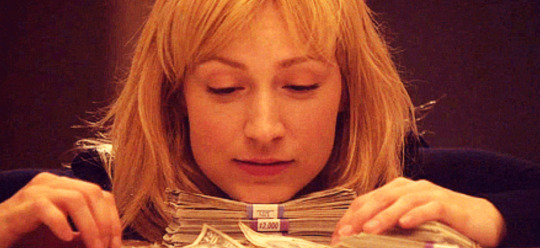
Parker is canonically autistic, from multiple word-of-god sources. One in particular I’d like to note is a tweet from John Rogers, who said she was originally “in the direction” of having autism, but it was Beth Riesgraf’s decision to play Parker that way, and they “wrote to her performance”. Many examples below are definitely actor-driven.
Struggles with social skills and a lack of real friendships through her life, but eventually connects strongly with a small group of people she considers family
Mimics social cues from others, including jokes she may not understand, body language, physical contact
Often has a straightforward way of talking; occasionally says things considered rude or not appropriate to the situation by others
Takes literal interpretations of statements, and sometimes has trouble understanding information taken out of context
Generally non-expressive or makes facial expressions not expected of a situation
Naturally avoids eye contact
Particular about touch
Special interest in types of safes & security, valuable art and items, other theft-related information
Stims by picking small locks she carries around with her, smelling things, organizing items, repeating words/phrases, and clenching her hands
Frustrated by unexpected changes to plans or her own expectations / Distracted by questions or expectations that she feels are unresolved
Gets attached to routines and traditions— ranging from seating arrangements (personal) to “Let’s steal a [blank]” (team)
Sensory issues (eg loud noise and clothing texture)
Low empathy / difficulty with empathy
When upset, may become increasingly curt or stop talking, as well as notably physically tense and disruptive
Favorite food is by far and obviously cereal, which she eats frequently and stocks boxes of the same type at both her own home and Leverage HQ
Examples + Episode Titles

Struggles in social situations
There are examples throughout the show of Parker struggling with social skills, and Sophie teaching her tips to grift, make friends, or understand others (notable episode: The Juror #6 Job)
Hardison creates a flashcard system for Parker to grift with, which she also uses for help with personal social interactions (The Rollin’ on the River Job)
Believes Hardison is the first person to have truly understood her (The Muddy Waters Job)

Mimics social cues from others
After the team mocks Nate for buying a car as a part of his “mid-life crisis”, Parker repeats the phrase in a way that implies she does not really understand the joke, but doesn’t want to be left out (The Homecoming Job)
After both Hardison and Eliot call Tara “hot”, Parker joins in, surprised when they react differently to her saying it (The Runway Job)
Monica Hunter grabs Parker around the arms, likely to stop her from leaving. Later, Parker grabs Monica in the same, odd way, likely because she believes this is a form of contact that Monica likes, since she did it first. (The Three Days of the Hunter Job)
Parker mirrors people’s body language from time to time (examples: on the MRI machine in The Snow Job, with Archie in The Last Damn Job)
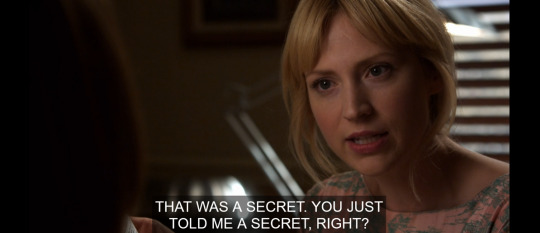
Often speaks in a straightforward manner, or says things considered rude or not appropriate to the situation
Throughout the show, Parker tends to say things pretty directly, and occasionally finds things funny that others find distasteful or confusing
Straightforwardness examples: Tells a woman someone’s trying to kill her, without sugarcoating it (The Mile High Job); “She was naked.” (The Maltese Falcon); talking about Nate’s alcoholism directly (recurrent); Points out to Peggy that she told Parker a secret, which means they’re friends (The Juror #6 Job); + many less notable instances of Parker’s straightforward word choice compared to other characters
Considered rude/inappropriate: Tells a client she doesn’t trust her either and laughs at a kid’s allergy because she finds it ironic (The Fairy Godparents Job); tells a woman her grandbaby looks like a dog as a joke (The Juror #6 Job); Laughs when Sophie asks her about the death of her father (The Snow Job)
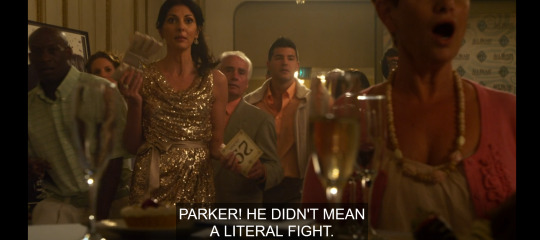
Takes things literally
Is a thief. ..... ;)
Mistakenly believes Nate wants her to hit someone after he asks her to start a “fight”; he later promises to be more clear, and use the word “argument” next time, acknowledging that he should have known Parker would be confused (The Lonely Hearts Job)
Not completely sure if she’s using air quotes properly, asks Hardison to teach her (The Beantown Bailout Job)
Gets caught up in the nonsensicality of the expression, “Reindeer Games” (The Runway Job)
Sophie and Harry jump to clarify to Parker that they’re going to only metaphorically burn something to the ground, to which she expresses disappointment (The Double Edged Sword Job)
Solves Nate’s algebra problem for him, which he had only said as a way to rib at Hardison (The Runway Job)
Initially expects a fiddle to be involved in the fiddle con (The Studio Job)
Doesn’t clock that noises she heard in an office were people having sex; John Rogers claims on his blog that it’s because she didn’t expect to hear them in that context. Not a fan of this joke, but noting it for the intention of establishing that Parker sometimes struggles when things are taken out of context. (The Underground Job)
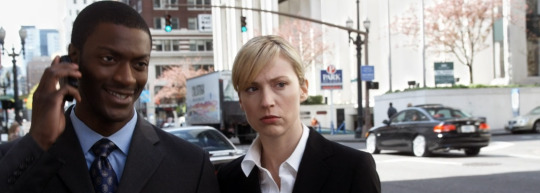
Generally non-expressive
Visual; every episode, including childhood flashbacks
Has traumatic memories of people being upset with her for not smiling as a child (The Stork Job)
“I’ve never seen her change her expression before.” (Sophie, The Two Horse Job deleted scene)
“[Parker showed] A feeling. Seemed like a human one.” (Tara, The Runway Job)
Her social worker used to do exercises with her to help her identify and name how she was feeling (The Toy Job)

Naturally avoids eye contact
Among Sophie’s index cards, pinned to help Parker learn social skills, is “Eye Contact” (The Juror #6 Job)
It’s hard to see whether or not Parker is making eye contact most of the time, due to the way that things are filmed, but you can see her eyes moving uncomfortably to and away from the “bank robber" father as he pleads with her to help him (The Bank Shot Job)
Another example is Parker asking Hardison if she did air quotes correctly, where you can see her make eye contact with him for a second before continuing the conversation with her gaze a little lower, towards his collar (The Beantown Bailout Job)
In her first conversation with McSweeten, in the FBI van, she is standing close to him, but seems to look him in the face very little, looking instead at his shirt or casually around the van (The Wedding Job)
You can see Parker looking away as she gives her fake backstory in the rehab clinic (The 12 Step Job). Sophie asks her to “share with the group, and not the floor” and that “eye contact is the gateway to communication”. Seeing as she is taking the chance to prod Nate for real behaviors she has a problem with, I see this as Sophie taking her chance to bring up a pattern of behavior that she wants Parker to correct, as well.
Sophie mentions that she taught Parker social skills such as “relating to people” and public speaking; one of her notes included “eye contact” (The Office Job)

Particular about touch
Finds it difficult to control her [violent] reaction when touched by strangers (mostly men, though she doesn’t like strange women touching her either). Parker is aware of this and worries she will ruin cons. [Could instead or also be related to PTSD.] (The Stork Job, The Ice Man Job, The Morning After Job)
Does not often initiate hugs, and when she does, teammates are usually surprised (The Maltese Falcon Job, The 12 Step Job, The Long Way Down Job)
Prefers short or light physical contact like sitting next to people, handshake-high-fives, shoulder punches, etc. (The Three Days of Hunter Job, The Long Way Down Job)
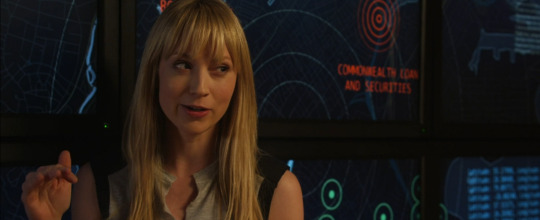
Special Interest in theft (activity & history) / security & safes / valuable art & artifacts
Excited to talk about the extensive information she has collected on security systems, and says it’s how she spends her weekends. Embarrassed when she thinks she’s being judged for sharing. (The Three Card Monte Job)
Passionate about different types of safes, especially unique or particularly difficult to crack kinds (The Grave Danger Job, The Great Train Job, etc)
Goes to museums and on vacations just to look at security systems, even when she has no intention of stealing (The Zanzibar Market Job)
Becomes aware that she doesn’t have “normal” hobbies or interests, and asks her friends to teach her how to like [other] things. (The French Connection Job)
Stims visibly at the thought of burgling 8 museums in one day (The Too Many Rembrandts Job)

Some stims I’ve noticed:
Picking small locks she carries around with her (repeatedly mentioned in the DVD commentaries by John Rogers, who compares it to knitting. He probably mentions it because it was not as visual as he intended.)
Smelling things, like money, people, etc (money in The Homecoming Job, the Ho Ho Ho Job, The Paranormal Hacktivity Job; Maggie and Tara in The Second David Job, The Lost Heir Job, an orange in The Juror #6 Job, etc)
Sorting and lining up things, like money (The Ho Ho Ho Job), spoons and pieces of her rig (The Inside Job)
Parker repeats words/phrases from time to time, such as “Intern Parker” (The Corkscrew Job), Sophie’s name (The Jailhouse Job), “Don’t Stab.” (The Morning After Job)
She clenches her hands and shakes in excitement at the idea of burgling 8 museums in one day (The Too Many Rembrandts Job)
She loves to hang from her rig [the ultimate stim], and multiple Leverage HQs are selected to accommodate this (The (Very) Big Bird Job, The Too Many Rembrandts Job)
Rocks aggressively in her recliner while stuck at home with an injury (The Broken Wing Job)

Frustrated by changes to expectations and plans / distracted by unresolved questions (these feel all grouped somehow in my mind)
Gets so mad at Nate’s repeated changes to the con in The Snow Job that Eliot has to drag her out of the room
Disappointed that the con changed and Nate didn’t let her continue cracking the lawyer’s safe, a part of the original plan (The Lost Heir Job)
Can’t let go of the disappointment that she never saw an emerald when they visited Emerald Island (The Cross My Heart Job), even though there was no emerald involved
Insists on continuing conversations that people fail to answer for her, even when they may not be that important (eg the Reindeer conversation in The Runway Job)
Parker jumps off the building on Nate’s original countdown in the pilot, probably ignoring the fact that he started over (The Nigerian Job)
She complains to Archie that the Leverage team is not very disciplined (The Inside Job)
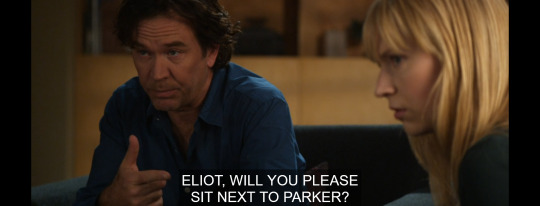
Attached to routines and traditions
Is flustered and unable to participate in the briefing because Sophie normally sits next to her on the couch, and now no one is, which feels wrong (The Ice Man Job)
Insists on completing the traditional “Let’s go steal a [blank]” format, and corrects others when she thinks it hasn’t been done correctly (The Boiler Room Job (particularly), The Long Way Down Job, The Too Many Rembrandts Job, The Panamanian Monkey Job, The Lonely Hearts Job, etc)
Insists that Nate specifically say the words, “will you marry me”, when he is proposing to Sophie (The Long Goodbye Job)

Has sensory issues
“Oh I hate business clothes. They make me feel so starchy.” (Parker, The Tower Job)
Arguably, her criticism of the clothes Eliot was trying to pick out for her to fake being a model (The Runway Job)
Her primary reaction to Hardison inviting her to a robot fight is that it seems like it will be very loud (The Girls’ Night Out Job)
Wearing the heavy boots made Parker repeatedly and visibly upset, which seemed like sensory overload. She asks Hardison to hum to calm her. (The Queens Gambit Job)
Related/Uncategorized: Sometimes hears music/sounds that others can’t (unclear whether the sounds always actually exist), as evidenced by her surprise that Hardison can hear quiet music (The 10 Lil Grifters Job). On his blog (for the same episode discussion), John Rogers says, “[Parker] hears... things all the time. She also sees things a little differently.” The ability to hear and/or inability to ignore certain sounds is a common trait in ASD. Less commonly, auditory hallucinations can also be a trait of ASD.

Low empathy / difficulty with empathy
“It’s also this whole thing about she wants to do the right thing and trying to understand what the right thing is.“ -Dean Devlin; “Most shows have someone who’s just trying to do the right thing, we actually have a character who’s not sure what that is yet.” -John Rogers (episode commentary, The Long Way Down Job)
Nate and Sophie send Parker to jury duty as practice for “consider[ing] other people’s point of view” (The Juror #6 Job)
“Look, she thought she was doing the right thing, which means she actually thought about what the right thing might be, which is huge for Parker.“ (-Sophie, The Boost Job)
Uses Nate, Sophie, and Hardison as a guide to morality, upset when she can’t follow their example and return the mountain climber to his wife (The Long Way Down Job)
References the team’s influence when deciding to return to steal the Blight, a move which surprises Archie (The Inside Job)
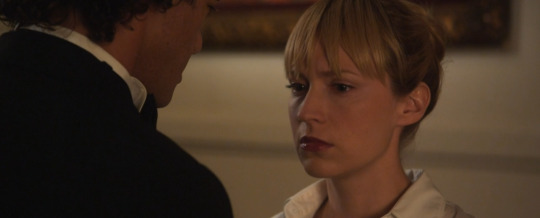
Speaks less when upset
After the man running the orphanage scam triggers her PTSD, Parker stops talking entirely [+stabs and runs] (The Stork Job)
When they free Hardison from the coffin, Parker is the only one who does not run up to hug him, and is not seen speaking to him again, presumably too overwhelmed (The Grave Danger Job)
When experiencing sensory overload by the heavy shoes, Parker grows very physically tense and more curt (The Queens Gambit Job); she is calmed by Hardison humming
Related note: Parker seems to know at least a small amount of sign language, which she uses while presenting her greeting card ideas to a room of people (The Office Job)

Food likes / issues
Parker’s favorite food is [a specific brand of] cereal, which she stocks in bulk at her home, as well as Leverage HQ, for easy access, eating it frequently (The Beantown Bailout Job, The Inside Job, etc)
She seems to also enjoy chocolate a lot, although this may just be a joke about Parker liking exclusively sugary foods (The Boiler Room Job)
Parker claims to not like food other than chocolate and donuts. She asks Eliot to help her appreciate food, after seeing that cooking is something he cares about. (The French Connection Job)
Thanks for reading! Please feel free to reblog or reply with any other character traits / episode moments you read as being tied to her ASD, or share any headcanons you have for her. ^_^
Note: Parker is Fictional, so everything about her was a choice made either by writers or her actress. The writers seemed to be writing her intentional neurodivergence in 3 categories:
1. Multiple sources do confirm that Beth and at least certain writers were portraying her as autistic on purpose; regardless of intention, that is how she comes across.
2. Parker had a traumatic childhood, so certain behaviors I listed above could have been intended (by writers/Beth) as PTSD / adverse childhood reactions, not particularly ASD.
3. Some writers absolutely threw in traits not mindfully connected with any specific neurodivergency or mental illness, but instead were jokes about Parker being “crazy” or odd.
Despite the 3rd point, Parker is multi-faceted and treated with respect by the show, and is generally regarded as a significant positive portrayal of a ND character. (though complaints for certain choices are valid)
#parker#leverage#parker leverage#leverage redemption#asd#please add any you'd like#this may say as much about me as it does parker#for writing all of this#op#infodump
625 notes
·
View notes
Text
Sweet Melodies ( Part 1 ) Bada Lee Fanfic
Part 1 — Part 2
~Not proofread~

Binna never thought that she would leave her home town. In fact, she never even thought that she would leave the country, but here she was. Sitting on the plane in between her mother and father as she started at a photo of her and her best friend. At the momment, she felt like crap.
She was going to miss her friends and most importantly her best friend. She had known her, her whole life, and this would be the first time that they would be apart, for a long period of time. However, that wasn’t the only reason why she was feeling like crap.
The other reason is that he didn’t even tell her friends that she was leaving. Hell, she didn’t even know she was leaving. Up untill two days ago. Apparently her parents thought it would be best to tell her last minute so she wouldn’t freak out, but that was the worst decision ever.
Her parents even told her that she wasn’t allowed to tell anyone about them leaving. The problem is, her parents were controlling and strict. They truly did love her but sometimes that took it a little overboard.
When she asked her parents why she couldn’t tell her friends. Her parents pretty much said they didn’t want anyone holding her back and ruining her future.
Her parents always suspecting that Binna’a\s best friends had feelings for her, but they neve did mention it in front of her. Another thing that everyone knew about Binna, was that she was naive about a lot of things. Having controlling and stict parents was the cause of that.
Her parents both came from religious families, which in return they became religious as well. They allowed Binna to choose whatever path she wanted to take when it came to religion, but that didn’t stop them from pushing thier beliefs onto her.
So when they discovered that Binna’s best friend was in love with her they was extremely against it. So to not tain her future, they decided it would be best to move the the United States. Without telling Binna, the main reason for their moving decision.
--------------------------------------
When Binna and her parents arrived in the States, Binna went into a deep depression. It finally became real to her, when she saw her new home. Before, she couldn't imagine her life without her friends, but here she was. Sitting in her new room crying on the floor, as she continued to listen to the music from her and Lee's playlist.
Her mental health started to become better as time went on. After a month of living in the U.S.Summer break was officially over and it was now time to go back to school.
Binna's parents enrolled her in a really good private school. However, if you ask Binna, it was a school full of white privileged people, who only cared about themselves. But she couldn't be any more wrong.
On her first day everyone was nice and welcoming. They gave her a proper tour of the school, and was very gentle with her. Knowing that this was her first time in the states, and that she was still learning English. They informed her about all the extra-curricular classes she could take and the sport teams that she could try out for.
She even made friends on her first day of school. They all reminded her of her old friend group back in South Korea and she loved it.
One of her closest friends that she made at her new school was Kirsten. They met when they both tried out for volleyball. They both made the team and she loved the sport. However, she tried to give up her passion for dance. Dancing was her and Lee's special thing, and the thought of doing it without her, made her sick. So she wanted no parts in dancing if she wasn't with her korean friends.
However, that didn't last long. Kirsten was a very social and active teen. She was a part of a lot of clubs and she tried out for as many sports as she could. But she always preferred dancing, So when Kirsten had the opportunity to be a part of a well known dance crew, called the Royal Family, she took the chance. But not without forcing Binna to do it as well.
Unsurprisingly, they both made the team and to the displeasure of their parents, they had to move to New Zealand, where the dance crew was based. Their parents didn't want them to move considering they were teenagers and still in school. So before the school year ended they studied hard and took whatever test was necessary to graduate early.
Their parents were thoroughly expressed and sent them on their way to New Zealand with the proper funds. Because they were minors, Parris Goebal, the leader of the Royal Family dance crew allowed them to stay with her. In which, the three of them became really close.
With their new found sibling relationship with Parris, they started to become the main dancers in the group. They were amazingly separate but with all three of them together, they were a powerhouse.
They were extremely popular in the dance community. Articles being wrote about them, fan pages made of them, and a whole brand was made by them. They were on a rise. Everybody knew about them, and to most people in the dance community, they were known as celebrities. Binna would argue that they weren't.
Everything was going good in Binna's life, almost a little too perfect. Until the eventful night that caused Binna's life to do a complete 180.
Hi loves! I wrote this a couple months ago and posted it on Wattpad. However, I wanted to post this on Tumblr as well so here you go!!:) I hope you enjoyed it. The next Chapter will be out soon!
-L3NA
#bada lee#street woman fighter 2#team bebe#jam republic#swf2#street woman fighter#bebe#bada lee fanfic#bada lee x reader#swf2 x reader
88 notes
·
View notes
Text
Now that we’re starting to see the fallout from the men’s sidelining of Mina, I want to discuss one of the central themes I see in Dracula, which is a critique of the Victorian ideal of womanhood.
Lucy fits the Victorian ideal perfectly. She is beautiful, sweet, kind, and fragile. She never displays any specific skills or interests of her own besides love for her financé, friends, and family. Her role is to inspire others’ action of her behalf by her passive goodness and purity, not to act herself; she dies without ever having known what is attacking her, or ever knowing about any of the blood transfusions she was given. This isn’t a criticism of Lucy; she is never (before her vampirism) portrayed anything but positively; I don’t buy the interpretation of her vampirism being a “narrative punishment” for sensuality or unorthodixy, because she is not, except as a vampire, ever portrayed as sensual or transgressive of social norms (even when she says “why can’t a woman marry three men” it is entirely in the context of being sweet and kind and not wanting to make her other suitors sad). On the contrary: she is the epitome of social norms. She is an icon of Victorian femininity - and that’s what gets her killed. Treating women as passive objects gets them killed.
Mina, despite one chapter’s digressions into having her condemn the “new woman,” is a very different and more modern figure. As if the start of the book, she works for a living (as a teacher). She pursues modern skills such as shorthand, typing, and reporting, and she is very good at them. Her letters and diary entries, even her writing style, show a sharp intelligence and a vivid sense of humour. She is brave and cool-headed in a crisis (as we see in the incident of Lucy’s sleepwalking). She makes her own decisions based on observation and good judgement (as with reading Jonathan’s diary), and she plans ahead and sees what needs to be done. She is crucial to bringing together all the necessary information about Dracula. And, for much of the book, she accomplishes all this completely untouched by him.
Until the moment the men decide to exclude her on the basis or her womanhood, at which moment she is almost immediately - on that very night - attacked by Dracula. (Not a spoiler - as of today, Oct 1, it is obvious from her diary entry). Even more, that exclusion not only endagers her by denying her relevant information, it endangers her and everyone because she can’t be open any more either. She fears that if she shows her unhappiness - if she tells anyone of her ‘nightmare’ - they will see it as further proof of nervous weakness and exclude her even more, perhaps send her away from London. (And - I didn’t realize ths until now - today’s very entries show she is right in fearing this. When Renfield presents his case rationally and is refused, he becomes emotional and desperate - and Seward sees that very emotion and desperation as a further reason not to listen to him!)
There is a very clear theme here. Treat women accoding to the Victorian ideal, neglect or ignore their talents, treat them as if their only purpose is to inspire men to greatness by their passive beauty and sweetness and purity, and you endanger both them and yourselves. Treat women as equals and helpmeets and partners, employ their skills and intelligence in concert with your own, and you can achieve amazing things together. Mina is absolutely still treated in the story as an inspiration to the men through her goodness, but that inspiration is in addition to real, practical contributions.
That’s not to say Dracula isn’t sexist. There’s a limit to how far the theme goes. Women are allowed to be talented and smart only provided that those talents are being employed in support of men - Mina learns shorthand to help Jonathan, memorizes the train timetables to help Jonathan, will no longer have a job after marriage but will help support Jonathan in his career, always acquiesces uncomplainingly to the men’s decisions and praises them. She never steps out of her assigned social place as a Victorian woman. It’s sexist not only by present-day standards, but also by the standards of the late 1800s/early 1900s women’s suffrage movement; it’s far from being at the forefront of progressivism even for its time. But it is a departure from typical Victorian ideals in that women’s place is seen as not just being beautuful, sweet, innocent, and an inspiration to men’s action, but in being an active partner to men, with talents, intelligence, initiative, and courage of their own. And men waste and ignore those talents at their peril.
736 notes
·
View notes
Text
Marchil crumbs part 2
Part 1 here - part 3 - part 4 - part 5 - part 6 - part 7
Unlike my other crumbs masterposts I'm gonna be doing the marchil one through different posts rather than reblogs because copy pasting my drafts would be hell.
Are you surprised there are enough crumbs that this part got past 30 pics? Yeah me too ngl. Part 3 is already full too, ooh boy
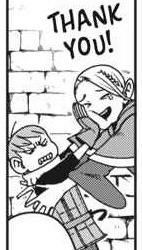
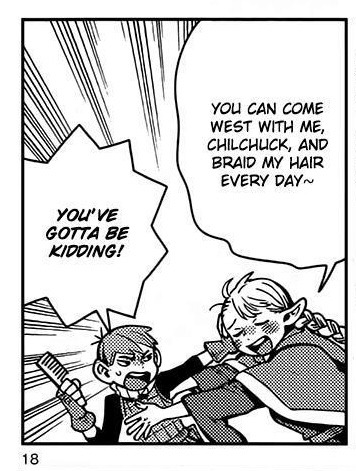
Beginning vs end (chapter 23 vs chapter 96)~ Oh how far they have come
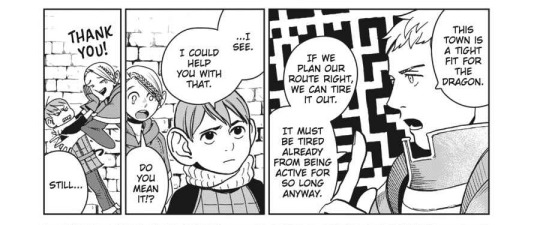

She sees him as dependable! For good reasons, despite him generally staying out of fights, but it's still nice to see her appreciating him.
More of him rushing to help her, and a bonus of the reverse:
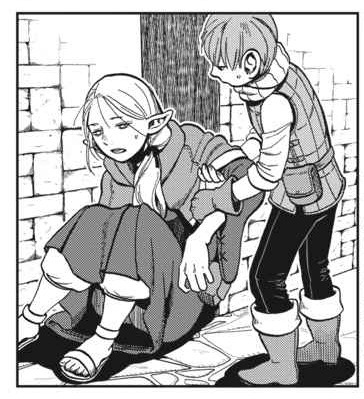
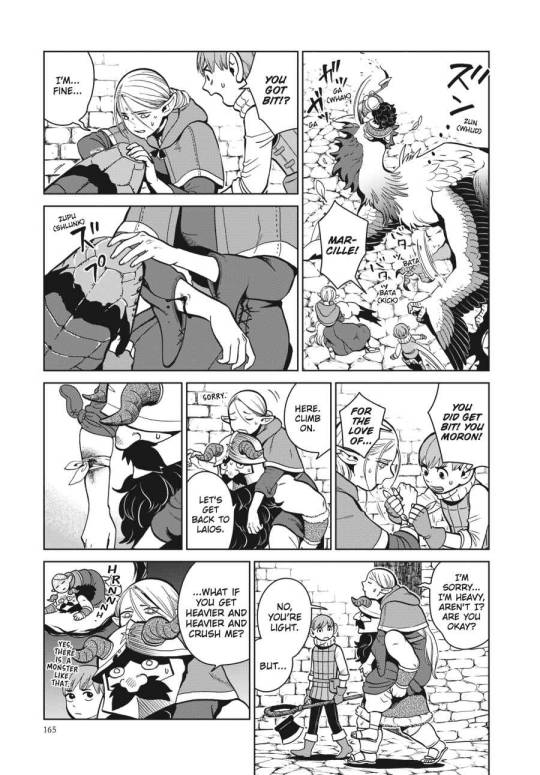
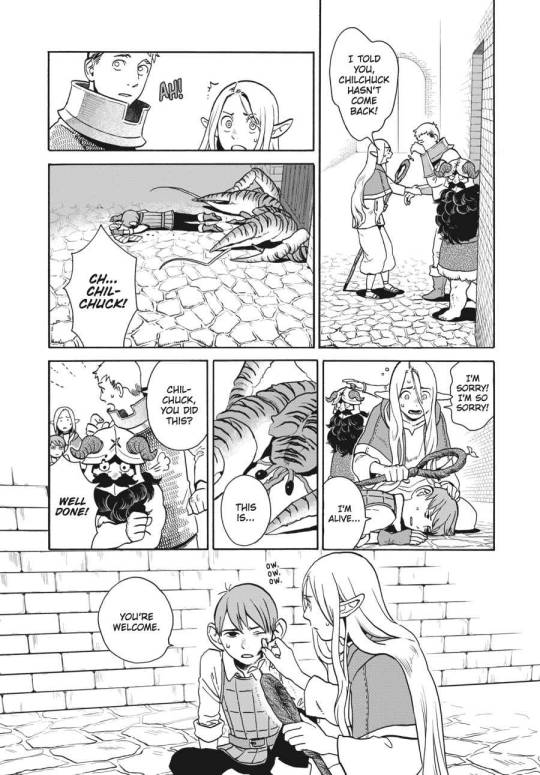
Let's keep looking at early Chilchuck & Marcille for a bit. I'll likely repeat myself between parts of this masterpost but they really do stick together and are on the same wavelenght quite a fair bit.
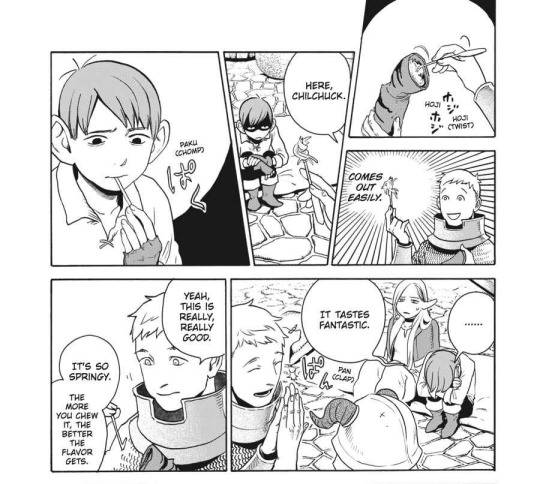
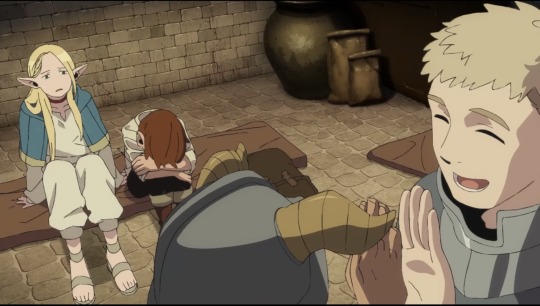
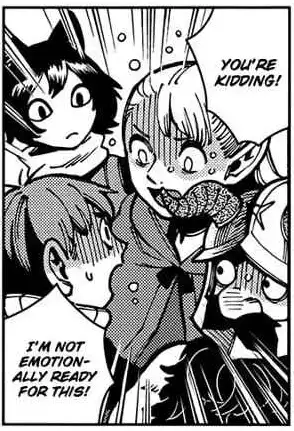

I state my case once more: comrades in disgust. It's more than that too, though! Despite their differences, despite their relationship being strictly professional, despite him dreading her addition to the party at first, he truly does care about her and values her perspective on this.
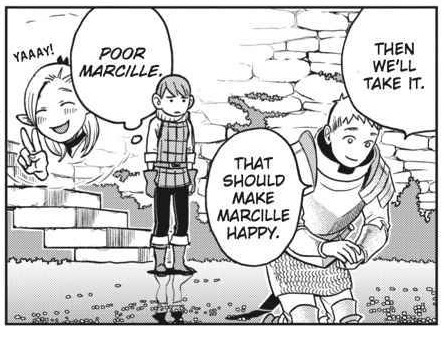
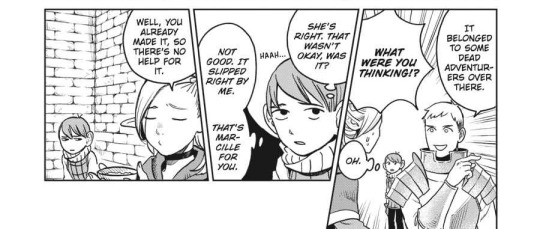
Chilchuck above is straight up implying that Marcille is the moral compass of the party, and seemingly appreciates that about her.
In part 1, I mentioned how they do argue, but always talk it out and it never turns into resentment between them, but I didn't show examples. Now is the time! Let's see how they hash things out.
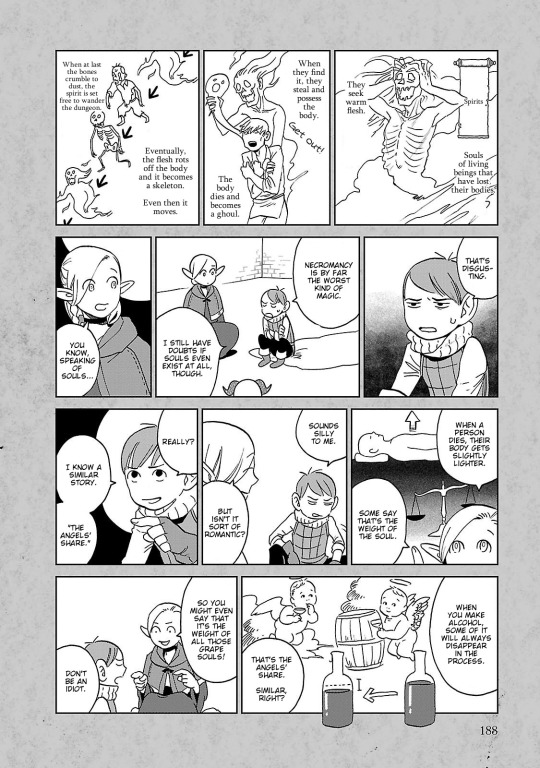
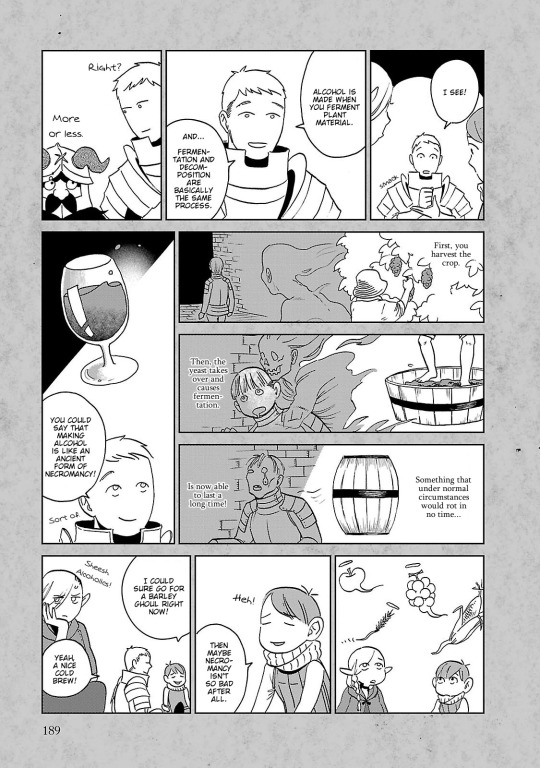
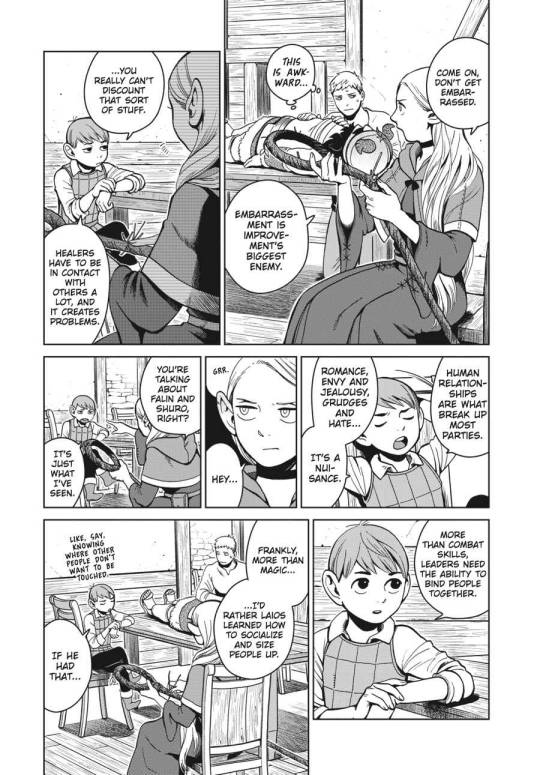
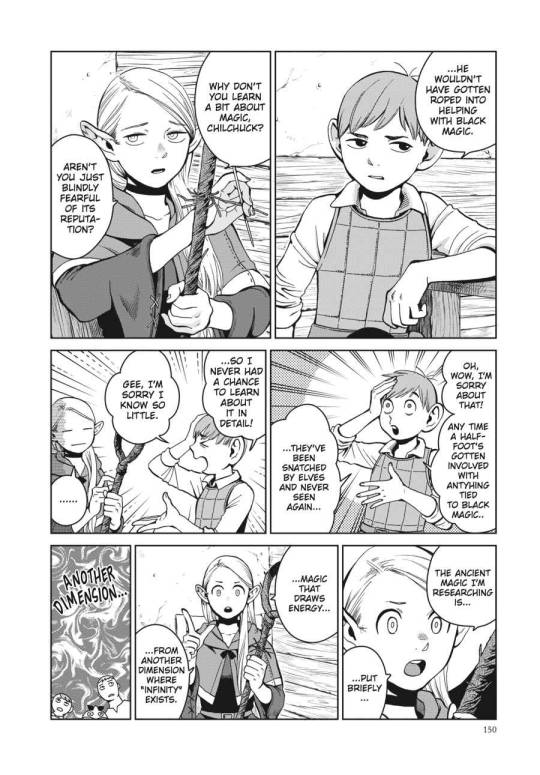
She's not offput by his brash demeanor and is very open to explaining. They don't typically tend to budge on the issues they debate, but they do have an earnest conversation with each other and the other doesn't fall in their esteem for it.
The biggest disagreements they've had is definitely Marcille using dark magic and the bicorn chapter, which was a both-way moment of tension between them. It was when she hassled him about a sensitive topic (his wife) and when he lied to her that he had cheated on his wife, because of that during the chapter Marcille is very cold towards him (but even then rushes to his aid and is worried for him when hurt etc etc), until he later opens up andthey have agoodlong good-natured chat about it, by the end they're both back to normal and laughing together. It's definitely the most Marcille & Chilchuck centric chapter out there, at this point give it a reread though we're running a tight ship here and it's 30 pics max.
Ok. Tangent over, back to how even though there are disagreements they don't fall in each other's esteem. Maybe it's more that they trust each other to have common sense really, which is running rare in these parts, but...
When they were apprehended by Shuro’s party, Chilchuck isn’t worried about leaving Marcille by herself, unlike with Senshi and Laios. And this wasn’t a decision without weight either, because this is JUST after she has used dark magic, but her letting that information slip and landing them into trouble doesn’t even occur to him. For a good reason since Laios ends up being the one to do just that... It's as much as a confirmation as we can get that he thinks she has the most common sense and social skills out of the party
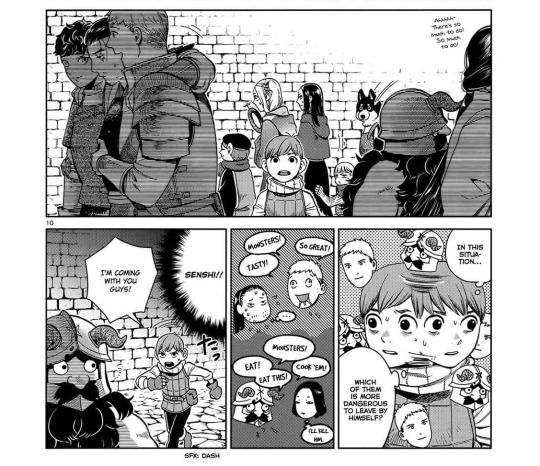
And speaking of putting stock in others: They strategize together and appreciate each other’s input very often! Part 1 already had some but here some more:
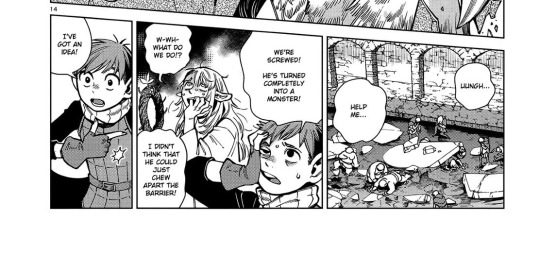
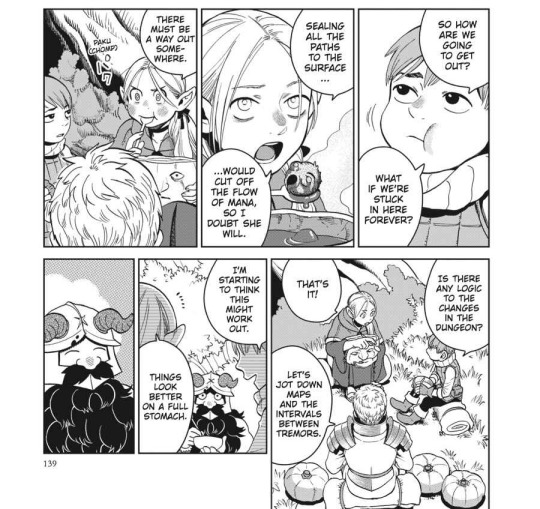
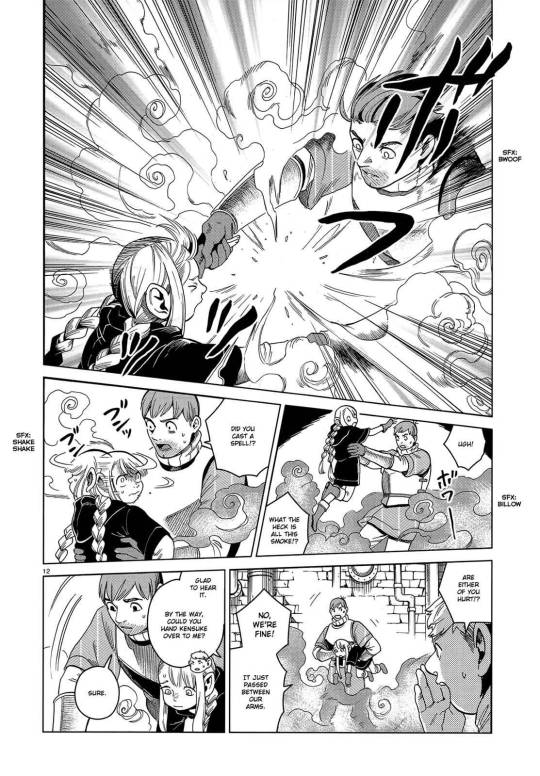
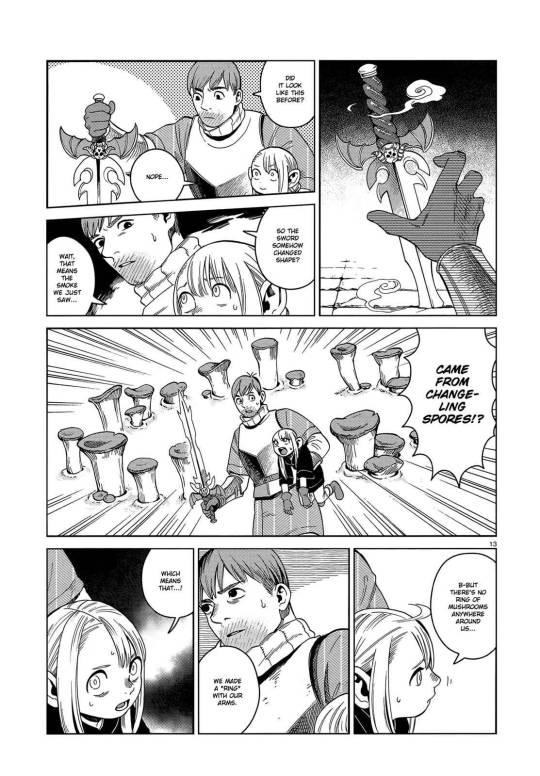
I do like how he gets to manhandle her after he gets manhandled himself so often lol. There’s also smth to be said about him having seen her as an halfling, since his type is blonde halfling women…
Bonus of Marcille being the very contrary of enamored with Chilchuck's changeling form:
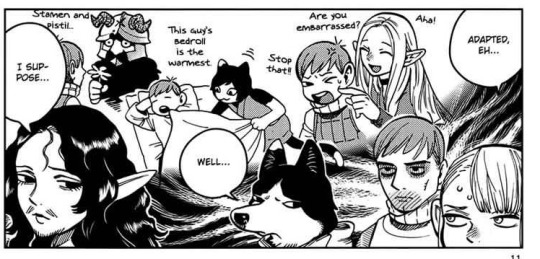
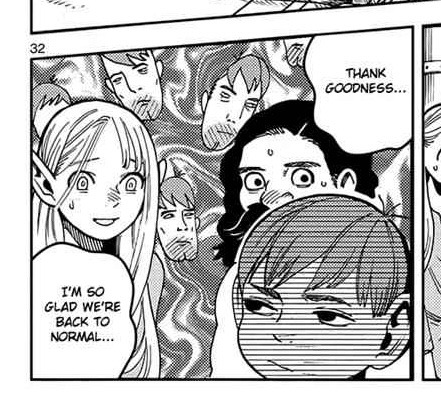
----
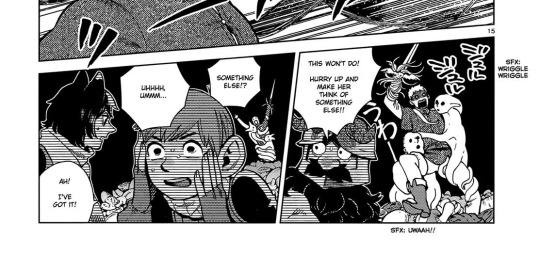
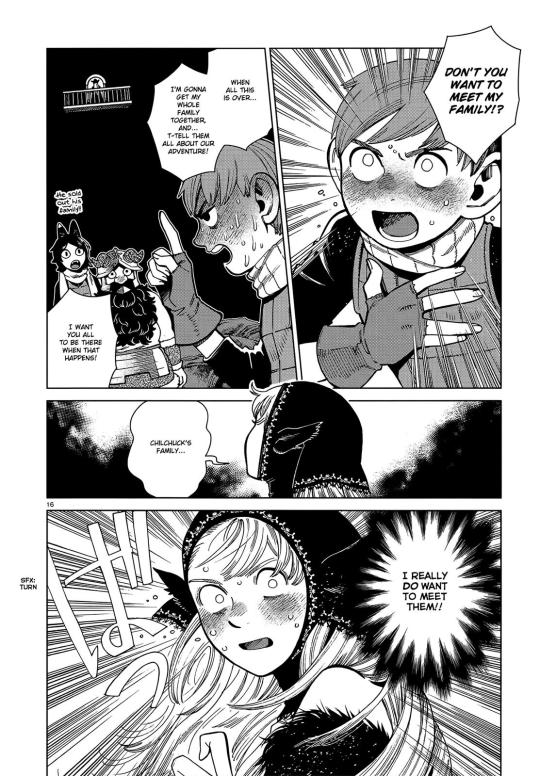
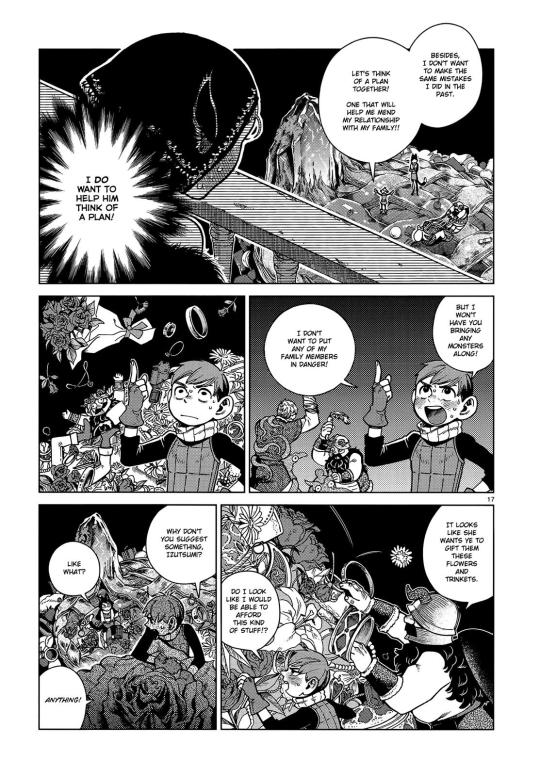
She is the best wingman. Has nothing but best of intentions. She wants to know her friends aka him better!! "I’ll invite you guys to meet my family" from Chilchuck means the world and more, they’re def not just coworkers anymore and man. MAN!!! Chil breaching that bridge for her. Him doing this because he knows she really wants that, AND blushing madly...
If you wanna go the extra delulu mile it's kinda like he's opening his family up to her and fully letting her in, and may I add inviting her into his family perhaps even like something resembling a proposal after which she showers him in flowers and lover's gifts and-
Tfw you need to make sure your friend doesn’t get an inflated price/you make sure your girl gets only the best. This comic means they went shopping together btw, despite how he dislikes waiting after people ♡
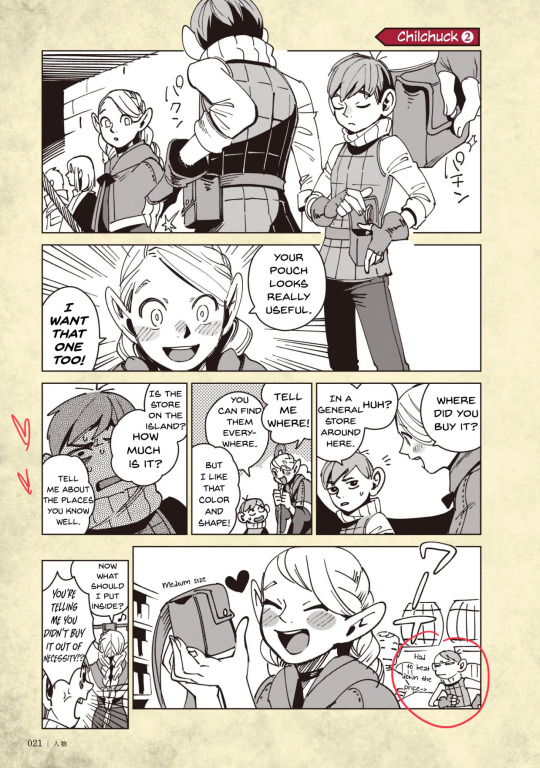
Nothing to say about these they're just funny:
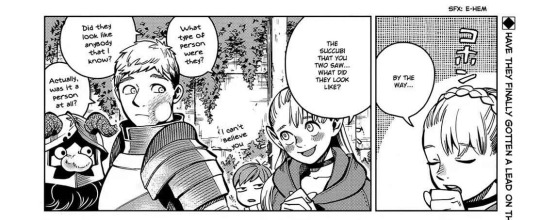
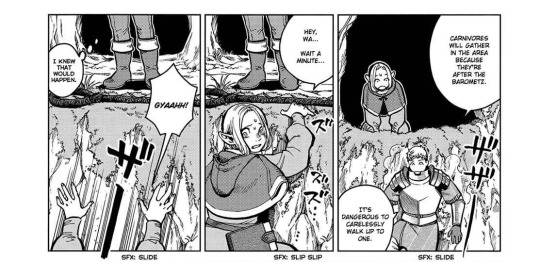
He do be keeping an eye and an ear out for her
Part 3 is here!
With juicy tidbits such as more of Chilchuck drooling over blond hair and them interacting across a table in the golden kingdom. Very fun very fun
#dungeon meshi#marcille donato#chilchuck tims#marchil#relationship analysis#sorry that my very soon was like a month but in my defense i was writing fics instead#marchil crumbs masterpost#shipping crumbs
51 notes
·
View notes
Text
Unconsciously Done: An Examination of Misogyny in the Treatment of Caroline Bingley in Jane Austen Fan Fiction
This essay is not meant as an attack on any specific author who writes JAFF. It is a criticism of a trend that is very strong in the genre and I find extremely problematic.
It is my firm belief that Jane Austen felt deeply for the plight of women in her era and that her books examine the difficult decisions that women were forced to make because of their secondary position in society. Jane Austen presents women to us who have little power and whose only hope in future provision and comfort lies in the whims of men. Moreover, Jane Austen never in her collected works, asks us to delight in the downfall or destruction of a woman. Given this context, I find it highly distressing and untrue to Jane Austen’s legacy that so often in Jane Austen Fan Fiction (JAFF), authors invite readers to celebrate the degradation of Caroline Bingley. This is a repugnant practice that both goes against the intent of Jane Austen’s works and by attacking a woman in particular is an unconscious display of misogyny.
After the Netherfield Ball, where the Bennet family shocks Elizabeth, Darcy, and Caroline with their vulgar behaviour, Caroline and Darcy agree that it would be better for Charles, Caroline’s brother, not to marry into such a family. Together, they go to London and convince Charles to remain there, away from Jane. Caroline writes to Jane to inform her of this. Later, when Jane follows them to London, Caroline cuts off the friendship, which lasted, we should remember, for only a few weeks. She also works to conceal Jane’s presence in London from her brother. She is aided in this endeavour, again, by Mr. Darcy. Her final act of the book is attempting to embarrass Elizabeth in company at Pemberley and then insulting Elizabeth to Darcy in private.
For the purposes of this argument, I will first lay out what the original Caroline Bingley does in the novel Pride & Prejudice. Caroline dislikes the unmannered inhabitants of Hertfordshire, specifically the Bennet family, a sentiment she shares with Darcy. They make fun of the Bennets behind their backs together in the first section of the book, along with Caroline’s sister Louisa. When Jane Bennet is sick at Netherfield, Caroline is not as attentive to her as Jane’s sister would like, despite spending several hours with her multiple times.
It is important to note several things. Firstly, none of Caroline’s actions cause lasting harm to anyone. In the end, Jane and Charles do marry. Secondly, Caroline is drawn by Jane Austen as a social-climber who is not above using artifice to reach her goals, but her actions are entirely rational within that context. Every action that Caroline makes is a logical expression of her two motivations, a wish to marry Darcy and a wish to see her brother marry well. Thirdly, Caroline is aided in nearly everything she does by Darcy himself. One could speculate that without Darcy’s interference, Charles would have returned to Hertfordshire as he planned. Darcy’s own words imply this, “with a stronger dependence on my judgement than on his own.” (P&P, Ch 35.)
The position of women in Georgian society is made clear through Jane Austen’s works. Women are dependent on their parents or guardians until they marry at which point they are dependent upon their husbands. There are only two acceptable options for women of the gentry, marriage or becoming a governess. When Charlotte Lucas submits to a marriage with Mr. Collins, we are told marriage was the only provision for well-educated young women of small fortune (P&P, Ch 22). Jane Fairfax, in Emma, is so upset with her the profession of governess, that she compares it to slavery (V 2, Ch. 18). Jane Austen is clearly of the opinion that a woman should marry for affection rather than only for wealth, but she acknowledges how difficult this line is to draw when marriage is so vital to a woman's life. Caroline is set up as a representation of a mercenary worldview in Pride & Prejudice. Like many other Jane Austen women, Mary Crawford (Mansfield Park, specifically her early interest in Tom Bertram), Lucy Steele (S&S), and Charlotte Lucas (P&P) for example, Caroline is pursuing a man for wealth rather than love.
Lydia Bennet is another woman whom Jane Austen, in the social morays of the time, could have condemned and invited us to hate. In Mr. Collins letter we hear the morality that would delight in a woman’s downfall, “The death of your daughter would have been a blessing in comparison of this.” (P&P Ch. 48). Yet again, the narrator does not invite us to treat Lydia with scorn. We are reminded of Mrs. and Mr. Bennet’s faulty parenting and that he ignored Elizabeth’s advice, we are reminded of the character of Wickham, and we are assured of Lydia’s future provision. Lydia will not fall into poverty because her two wealthy sisters will protect her. Her sisters do this despite the fact that they had the most to lose from her rash actions. This demonstrates an acknowledgement that all women, despite their faults, deserve to be protected.
It is important to note that while Jane Austen invites the reader to disapprove of these women who marry for money, she does not outright condemn them. Charlotte Lucas’s decision to marry Collins is explained with some compassion. The narrator notes that, “the boys were relieved from their apprehension of Charlotte’s dying an old maid” (P&P, Ch. 22) which again reminds us of the importance of marriage for a woman’s future provision. Maria Bertram (Mansfield Park), who married for money and then committed adultery for love and whose actions are clearly condemned, is still allowed compassion. The narrator mourns that Maria must suffer more than her male counterpart for the offence, "In this world the penalty is less equal than could be wished” (MP, Ch. 48) and Sir Thomas spends a good deal of time blaming himself for not raising his daughter properly, “here had been grievous mismanagement” (MP, Ch 48).
Unlikely as it is for Jane Austen to desire further punishment for Caroline, it is more improbable that she would wish for men to exact that retribution. We are told in the history of Eliza Brandon, (S&S) how much power a man can exert over a woman in their guardianship. Eliza is confined to the house and allowed no pleasures until she submits to a marriage to a man who will treat her with cruelty and steal her fortune. This action is despicable and is presented as such. Yet, many authors write Charles Bingley exerting this same sort of control over his sister, or at least threatening it. They wish for him to cut off her allowance and thus financially constrain her behaviour. They have Charles threaten to disown his sister, who in such stories is under his guardianship, or sometimes even give her money away. Not only is this unnecessary, as Charles already can control his sister’s behaviour to an extent as we see during the visit from Mrs. Bennet when he “forced his younger sister to be civil also” (P&P, Ch 9), it is cruel.
It is unlikely therefore, that Jane Austen meant for us to hate Caroline or take pleasure in her imagined downfall. In the original novel, the ‘punishment’ Caroline receives is equal to her actions, she must endure seeing Elizabeth Bennet raised to the position of mistress of Pemberley. It is the same thing that happens to Lady Catherine de Bourgh, who like Caroline, wants Darcy to marry for wealth rather than affection.
More distressing are the words used by characters in works of JAFF, mostly by men who in Jane Austen’s original works treat women with respect, about how Charles might control this “deviant” sister. These terms are often far harsher than anything used for the correction of Lydia Bennet, whom we know to actually be unmannered and wild. Proposals that Charles, “bring Caroline to heel” are repugnant. Caroline is a human woman, not a dog. However one imagines speech in the Georgian era, these are not words used by Jane Austen. Suggestions that Charles cast her out of the family home or be obliged to lock her up, when not said in jest, are terrifying. In this society, these things could happen and would be catastrophic to Caroline.
Even the mere suggestion that Charles should control his sister’s speech in in a start contrast our exaltation of Elizabeth’s lively manner. Jane Austen allows us to find Mr. Collins distasteful for suggesting that Elizabeth controls her tongue, “and your wit and vivacity, I think, must be acceptable to her, especially when tempered with the silence and respect which her rank will inevitably excite” (P&P Ch. 19). Yet, JAFF authors want Charles to do this to his own sister! Would it be in keeping with the morality of the creator of Elizabeth Bennet to have a man force a woman into silence? Jane Austen gave women voices and ideas in a time when that was counter-cultural, yet 21st century authors, most of them women, want to send Caroline back to the dark ages.
Some authors have this same abuse performed by a husband that Caroline unfortunately marries for money or through "compromise" (a common but likely ahistorical trope), only to find out he is cruel. There are stories that present this outcome as just instead of horrifying. Again, these are 21st century authors, relegating a 19th century woman to a cruel marriage in which she has few rights and little chance of honourable escape. Occasionally Caroline is married to Wickham, and instead of Elizabeth Bennet pitying the match, as she does for her sister Lydia, she often finds it funny or just. The idea that any woman deserves to be trapped in an abusive situation, or have her wealth stolen from her by a deceitful suitor, is again, repulsive.
The final degradation that Caroline faces is also the most troubling: authors repeatedly deprive Caroline of her rationality. Jane Austen’s Caroline is a rational creature, as are all the women that are depicted in her works. Good or bad, Jane Austen’s women are carefully rendered images of real life and they have motivations that guide their actions. Caroline’s two motives were discussed above and her actions are entirely rational based on her goals Even if we dislike Caroline’s reasoning and acts, we ought to respect her humanity. Unfortunately, many works on JAFF, in an effort to create a more villainous character, twist Caroline into an evil, insane, psychopathic version of herself, bent only on cruelty and hatred, without any clear goals.
As for authors who relegate Caroline to a life of perpetual dependence, Jane Austen herself only consigns a single woman to this fate, Miss Bates in Emma. Jane Austen treats Miss Bates with respect and kindness, creating a town around her that takes care of both her physical and emotional needs. Emma is admonished by Mr. Knightley for ridiculing Miss Bates before other members of the community. To Jane Austen, a woman in perpetual dependence should excite pity, not disgust or laughter. Miss Bates also is granted a voice and we, along with Emma, are encouraged to listen to her and respect her value as a person.
The reason that all of this is so disturbing and repugnant is because these words are written by modern authors, people who should understand how oppressive and wrong the subjugation of women was in the Georgian era. For those authors, many of them women, to attack a fellow woman with the very tools of the patriarchy that we have ourselves struggle to throw off and fight against is horrid. Jane Austen does not resort to these methods; Caroline Bingley is not bent under the power of her male guardians in Pride & Prejudice. The only woman who is, Eliza Brandon, is an example we are supposed to pity, not scorn.
Worse, Mr. Darcy himself is an active participant in almost every bad action of Caroline. Yet, while Darcy is forgiven completely, and often given excuses like shyness for his actions, Caroline is again and again vilified. It is a double standard of the worst kind and one that especially female authors should recognize as unfair and unjust. Yes, we do not see Caroline’s apology or reformation in Pride & Prejudice, but she is also not a main character. Many JAFF works almost seem to forget Darcy’s interference or rudeness towards Jane and the rest of the Bennet family. He is excused and Caroline is hated and destroyed.
Instead of a human with rational motives, JAFF authors imagine Caroline as a demon. Caroline becomes a playhouse mirror imagine of Elizabeth, who is often turned into a “Mary-Sue” or a picture of perfection. This Carrie-Sue (credit to Amelia Marie Logan, who coined the term) acts in a way that Caroline of Pride & Prejudice never would. Carrie-Sue attacks and insults people in public without motive, including her own brother; she continues to pursue Darcy after he is married; she continually attempts to “compromise” him; and she will do anything no matter the cost. She is a grotesque in the worst sense of the word and she is not of Jane Austen.
If there is one overall thesis of Jane Austen’s works, it is that women are rational creatures. Elizabeth Bennet and Sophia Croft (Persuasion) actually use that term explicitly, but every heroine in Jane Austen demonstrates this same theme. We see inside their heads and we understand their humanity. Even the women we are meant to despise display rationality. Fanny Dashwood of Sense & Sensibility for example, talks her husband out of giving money to his sisters because she is greedy. Lucy Steele lashes out against Elinor Dashwood because she is fearful of losing her one chance at financial security: Edward Ferrars. Mrs. Norris (Mansfield Park), probably the cruellest woman in Jane Austen’s works, abuses her niece because she cannot bear her own inferiority to the Bertram family. She relieves her own feelings of dependence by pushing her niece further below herself. All of the actions of these women are despicable, but they also follow cogent motivations.
This is especially problematic because it is almost always Caroline who faces this treatment. Wickham, a character who actually deserves the term “villain”, is allowed rational motives, most often lust, revenge, and greed. He is allowed to retain his humanity and his mind; it is a woman who is deprived of hers. As I have stated, I believe this is done without malice on the part of the authors, but I would ask them to reflect on every instance, for I know there have been many i their own lives, where another person has deprived them of their humanity based on their gender. It is a pervasive problem that persists in our modern society and we ought not perpetuate it in our works of fiction.
To conclude, Jane Austen does not delight in the destruction, humiliation, or subjugation of women. If we wish as JAFF authors, and as women, to honour Jane Austen’s legacy, then we should refrain from doing those very things and from depriving a woman of her rational mind. The treatment of Caroline Bingley in JAFF is a form of misogyny and as such it should be stopped. This is important because while Caroline Bingley is of course fictional, the representation of women in fiction can perpetuate stereotypes and prejudices in real life. Jane Austen wanted to tell the world, through her fiction, that women are humans worth listening to and worth respecting. Let us leave Carrie-Sue behind and allow Caroline Bingley to finally live in peace.
#caroline bingley#pride and prejudice#jane austen fan fiction#JAFF#people hating her only makes me want to defend her harder#women are rational creatures#even Caroline#even Lady Catherine#Jane austen never delights in a woman's destruction#not even Mrs. Norris is really punished that much#I call fanon Caroline a Screaming Bag of Evil#fictional women do matter#fiction can shape our biases over time and our expectations of how people act
210 notes
·
View notes
Note
Hi! So I’m trans and I’ve been going by my preferred name for a long time, and everyone calls me that name (except for family who are transphobic). But basically, I want to legally change my name. I still get called my deadname a lot when it shows up on legal stuff and I hate it. So I need to convince my mom So my question is, how can I bring this up and convince her to let me change it? I already know the legal process.
Lee says:
You know the legal process already which is a great first step! But knowing what the process will entail both legally doesn't mean that you've fully considered the logistics.
Start by making a list of all the places where you will have to update your name (school, doctor's office, bank, social security, health insurance, etc) and then look into what each of them requires to update your name.
There's a lot of paperwork that needs to be done when someone changes their name, and you want to show that you're aware of that, you've read all of the applicable policies/guidelines already and you're prepared to handle it yourself.
Convincing your mom that you're ready for the decision will also be easier if you can show her how committed you are to it. In total, a legal name change can cost $500 or more (in some cases; some people pay less depending on the fees where they live and if they are eligible for fee waivers for court fees) and you'll need to calculate that exact cost for your situation.
You'll probably need to pay court fees (often $250 or more), a few certified copy of the original name change decree (often around $10 per copy), the cost of a new ID if you have a learner's permit, driver's license, or non-driver's state ID (often $13 or more), plus the cost of a new passport and passport card (around $160), an updated birth certificate (around $55), etc. And of course you'll also need to think about the fees for mailing things through the post office.
Depending on your state's laws, you may also need to pay to publish notice of the petition in the newspaper for some amount of time like three consecutive weeks if your local newspaper charges for notices to be published, and you may have to pay to have documents notarized.
Now that you've calculated what the cost of changing your name will be, you need to find a way to get that money. Once you've saved up all the money that you'll need to change your name, move on to the next step.
Finally, collect all the information that you'll need (save all the links to a document or print the website pages) and print out all of the forms that you'll need (court forms, social security forms, passport forms, school policies and forms, etc). Don't think of this as something you're doing to convince your mom-- you're doing this for yourself, because it's what you need to do!
In this situation, I'm assuming that your mom supports calling you by your chosen name and isn't included in the 'family who are transphobic' category. I'm also assuming that in your state you either need only one legal guardian to consent to a name change, or you only have one legal guardian (your mom), or you only need to convince your mom and then she will convince your other parent.
Getting your mom on board will be easier when you can show her that you've fully considered the process of legally changing your name, but you also have to convince her that 1) it's something that you NEED to do, and 2) it's something that you need to do NOW and not when you're 18 or older.
Having that type of conversation isn't easy, but it's a good opportunity to show off your maturity. That means listening to her concerns and actually addressing them, not yelling at her (I know you wouldn't but I have to say it!! Some people do!!), trying to stay calm and taking deep breaths, etc.
If she says that she's worried that you'll change your mind because you're young, tell her that you've been using this name for years and are unlikely to change your mind.
If she doesn't understand why you can't just wait until you're older to change your name legally, show some vulnerability, get emotional, and talk about how being deadnamed affects your levels of gender dysphoria, how often you come across your deadname, how your mental health will be improved when you can change it, etc.
Recognize that you'll likely need to have multiple conversations with her on the topic and it won't be a single one-and-done in a day-- it may take several months before you win her over. Try to keep the big picture in mind. If you have a therapist, they may be able to help you prepare for talking with her.
Finally, remember that you know your mom the best! The things that might have convinced my mom aren't necessarily the same things that will convince your mom. The things that my parents were worried about may not be the same things that your parents were worried about. You are the only one who can figure out what the right path is for you to achieve your goal.
The last thing I'll note is that sometimes you can't win every battle. I was able to convince my parents to let me change my name legally as a minor, but I wasn't able to medically transition until I turned 18.
If you aren't able to convince your mom to let you change your name, remember that it isn't the end of the line. Eventually, you will be 18. And all of this work that you've done will make it much easier for you to change your name at that point-- you'll have all the paperwork at the ready!
It can be difficult to be unable to transition in a way that you need to, but know that you'll survive and you'll get there eventually, and you need to take care of yourself (physically and mentally!) in the meantime to be at your best when it is time for you to achieve that goal.
Followers, any advice for anon on convincing a parent to let you legally change your name as a minor?
112 notes
·
View notes
Text
Mentopolis: Wordplay for Episodes 1 and 2
(One for episodes 3 and 4 will be coming)
Cerebell Pacific - The cerebellum is a part of the brain that affects motor control and, to some extent, cognitive functions. In the city of Mentopolis, this is where the Synaptic Switchboard resides. Older telephones utilized switchboard systems. The name is a play on one of the real life telecommunications companies that formed under the Bell System. [Side note: Pacific Bell became AT&T California and Bell Atlantic became Verizon.]
Occipital Park - Occipital means related to the back of the head. The occipital lobe has several areas related to vision. Possibly a play on New York's Central Park.
Cortex City - The cortex of the brain handles higher functions like consciousness. The cortex has 4 lobes: frontal, parietal, temporal, and occipital, which seem to be a LOOSE basis for the mapping of the city's districts. It is NOT a one-to-one correlation, though. Many famous cities are nicknamed as ____ City, such as Empire City (NYC) or the Windy City (Chicago).
Motor City - A section of Mentopolis that corresponds to the limbic system. This area contributes to behavior, memory, emotions, motivation, etc. Also the nickname of Detroit due to the automotive industry.
Imelda Pulse - (Impulse) Her family is influential, not simply because they are "old money" but because they are among the few who can directly influence The Big Guy. The Pulses may have been here before the city was founded, which I took as referring to the stages of fetal development. Imelda herself is prone to being reckless in an impulsive sense, to both positive and negative effect.
Hunch Curio - (Curiosity) He's a private detective motivated by curiosity, and eager to answer questions. He isn't always the deepest thinker; he tends to take a pretty simple approach. His body of work is built on answering pretty much any query that crosses his path. Unlike Danielle's character, he seems to thrive on the "puff piece" mysteries that she's grown tired of, and they often run into each other while working. To their mutual frustration.
A real swingin' dick - Fun wordplay here. A shorthand way to refer to a detective, typically a private investigator (see the Theme song for Shaft). It is also, of course, a slang term for male genitalia. Makes for easy double entendre: Hunch is a real on-the-move, following-the-clues professional, and/or he maybe has a big penis.
The Fix - (Hyperfixation) A fixer of situations. The Fix eliminates distractions, as requested by the DA's office, that could compromise The Big Guy's work. He's not only efficient, but he LIKES his job, weirdness and all. He is honest, straight-forward, and genuinely nice most of the time. He has a fondness for children though he's not instantly better at interfacing with them compared to adults.
Mark Bition - (Ambition) Can we PLEASE talk about the detail of that TIE, though?! It's doing so much for not only the art composition, but also just informing the personality of the character. Like, yes, obviously, homeboy's the District Attorney, he travels in a fancy car with a souped up engine, is well-dressed, etc. HE WEALTHY. His stocks and social status are on the RISE! But there's also a slightly unnerving, possibly sinister undertone to him. That arrow-esque tie not only evokes rising wealth, but also kinda resembles a devilish tail.
Don Avaricci - Part of the criminal underworld. Avarice is greed. His enforcers/thugs/goons include Roscoe Hungry, Johnny Gullible, and Simon Praise, to name a few. Per the Adventuring Party for "The Scattered Mind", Brennan indicated this crime family is all "appetites" of a kind.
Conrad Schintz - Con Schintz (Conscience) Conrad is a "too small" boy living on the streets and selling newspapers. He's the under developed moral compass for Elias Hodge; he has an inkling of what good and bad decisions are but has reservations about speaking up.
Justin Fication - (Justification) The only part of Elias' mind that isn't humanoid. Which is sort of a fascinating choice - that the part of his mind that requires REASON is remarkably intelligent, but also the most animal-like. If Justin is somehow a manifestation of Conrad's who goes away when the kid starts to grow up I will lose it
Anastasia "A" Tention - (Attention) As a reporter at the Daily Observer, it's pretty straightforward that she's got a keen eye. What sets her apart from Hunch is she's after the Bigger Picture and things making sense. She's less prone to instigating violence, but she can keep her cool under pressure
While we see the first name Anastasia on the character card, I noticed Danielle mostly refers to her character as A. Later conversation suggests she is a less well-known relative of the Pulse family, which might make her name originally A. Pulse.
A Pulse -- > Being "on the pulse" of something means to "be aware of the latest things happening" about a topic, which lends itself very well to a reporter.
It's possible the names Anastasia and Imelda were chosen because they sound uppercrust, or because of their connections to influential families. More literal name meaning seems less likely at this juncture, but with D20 anything is possible. (While Anastasia is related to resurrection, the name Imelda is related to an all-consuming fight or powerful battle)
Anastasia's file number is 001, and Imelda's is straight up ?? - I got a little lost in the sauce a few days ago trying to analyze everyone's file numbers. At first, Imelda's seems like a fun nod to her being the "mysterious" femme fatale type - and yet, because of the genre and how talented Siobhan is, I'm now instantly suspicious that some other shoe is going to drop. Like she's secretly working for the DA or Don Avaricci or something to obfuscate the mystery.
Norrell Ojiccle - (Neurological) Murder victim, employee at Cerebell Pacific for the Switchboard. Seemingly an average brain citizen. He may have sought out the prohibited Oxytocin at Sugah's due to loneliness. His death is quite possibly the first domino in an onset of Depression for Elias Hodge, or something more complicated. Also, he has four arms. I'm not letting that art detail go until we get a crew Adventuring Party for this season. His file number refers to the police code for a murder.
Daniel Fucks - Proprietor of Sugah's, and the go-to guy for pleasures and delights, carnal or otherwise. The pleasure center of Elias Hodge's brain.
Sugah's - Located in the pleasure center of the brain. The name refers to sweets. In this setting, this is the speakasy/club where you come to find something to feel good. Pleasures could be based in anything one might find enjoyable, but the establishment seems to be popular as of late because of the prohibited substances due to city ordinances.
Donna Fucks and Club Spice - Due to improv worldbuilding from episode 2, these may now exist. Donna is the sister (possibly twin?) to Dan, based on the correlation between pain and pleasure. She runs a parallel club (possibly with more adult themes) and works even more than Dan does.
Leon Logic - Mayor of Cortex City. Insistent upon how much "sense" his campaign makes. His abbreviated name L. Logic could suggest illogic - though this is not confirmed. Maybe he's just the "face" or "mouthpiece" of the leadership structure, and someone else is coming up with the "big plans" for Elias.
Hans Schadenfreude - (Do I really have to explain this one? Avenue Q has a whole song about it) Okay fine - coming from the wonderful German language, this refers to deriving pleasure from the misfortune of others. Every Hans interaction is S Tier, he's probably my new fave Brennan NPC.
Libby Longshower - She's the waitress at Sugah's, which suggests she's some kind of pleasure. She might be a simple one, the feeling of luxuriating under hot water. Her name might also be a nod to the more physical self-pleasures that one someone might enjoy and it results in a long shower. Her file text describes her as one "steamy" tomato and her file number might be a reference to a police code for lewd conduct.
Joey Sneezes - Seems to be a specific type of pleasure, the relief of a good sneeze.
Oblongata Station - The Medulla Oblongata is where your brain and nervous system connect. It has a lot of functions, which makes sense why the stationmaster in Mentopolis has so many different levers to access certain functions. The trains seem to operate along the nerve connections. The stationmaster's name is Max Medulla [although I think the character file spelled it with one "l".]
Chief Alexander Tightass - Literally A Tightass. The uptight chief of police. Works in conjunction with the DA's office but only within the bounds of the law. He's not immune to temptation (see flirting with Dan Fucks) but he doesn't give in to it. He's very committed to his job, much like Elias has been for Gobstopper Industries.
Donny Urges - An urge/desire/impulse that seems to have become an Intrusive Thought. Now neutralized.
Freddy Focus - Editor-in-Chief of the Daily Observer. He has one big eyeball which is also the logo for the newspaper. He seems to intense but limited perspective - he prioritizes urgency and short-term developments over the "bigger picture" stuff. Maybe the one eyeball also indicates this lack of perception.
Receptors - Not really a pun, but they function much like post office workera or message couriers. Different receptors report to different authorities: Wilton, for instance, answers to Dan Fucks.
Millie and Ollie - Workers at the memory bank which is the library of the Hippo Campus.
Wilton - An elderly pleasure receptor from the genitalia. His appearance is a reference to "blue balls" and his name is clearly a play on "wilting" as in a flaccid penis.
Shock troops - Also known as assault troops in the real world, they are formations to lead an attack. In Mentopolis, they are a personification of actual Shock following a trauma. They jump into action to silence pain through violence and arrest.
35 notes
·
View notes
Text
Are the palaces’ finest up to the job? You might think that the younger, more digitally native royals and their advisers would be more adept at handling the modern media environment, while fuddy-duddy Charles and Camilla would not. But one of the most surprising subplots of the medical drama that has played out in London over the past few months is how well Charles and Camilla have played their hand compared with William and Catherine.
[...]
The Waleses, guided by Lee Thompson, who cut his teeth at Freud Communications, a P.R. agency, before moving to CNBC and NBCUniversal, where he was praised for his digital and social-media skills, were less sure-footed. Their initial decision to give no details of Catherine’s surgery in January but to simply indicate it was serious—two weeks in the hospital, followed by months recuperating at home—created a vacuum that social media was only too eager to fill.
William’s last-minute decision to pull out of speaking at a memorial service for his godfather, King Constantine of Greece, in February, citing a “personal matter,” further cranked the rumor mill.
Kate’s amateurish Photoshopping of her family photograph, released on Mother’s Day in the U.K., revved up the global online guessing game about her health. Her apology for the “confusion” the image had caused, but not her decision to doctor it, opened up her and her family to derision.
By now distrust of Kensington Palace was such that when the Waleses allowed newspapers to publish a grainy image of them during a visit to a farm shop in Windsor, many wondered if it wasn’t them at all, but rather doppelgängers.
Thompson and the Waleses appear no match for Andreae and the King and Queen, but those close to both Buckingham Palace and Kensington Palace say other forces are at play. Paddy Harverson, a media strategist who has worked with most of the senior royals, points out that Catherine and William needed time to come to terms with her diagnosis and explain it to their three young children. True and reasonable. But with 20/20 hindsight, waiting weeks and weeks to reveal the truth was far too long. Those close to the Waleses also criticize newspapers for reporting on the social-media speculation, “which they knew to be batshit crazy but ran with it anyway because it produced headlines and clicks, which generate revenue.”
Some observers draw a distinction between the Waleses’ and the King and Queen’s attitudes to the press. One seasoned royal correspondent points out that Charles and Camilla are “much more experienced in crisis management than any other members of the royal family. They have seen it all and have the scars to prove it and, as a result, are much more relaxed these days about how much information they share.”
By contrast, “William and Kate are more private and can be very stubborn,” he says. “When they get an idea in their head—for instance, ‘we won’t share any medical details’ or ‘here is the one picture we want to release to the media’—it can be hard to shift them.”
He adds that “thanks to Harry’s endless court cases in London, people assume that he is the brother who loathes the press, but, if anything, William hates the media more. He naturally wants to protect his family, but that does not always mean he and Catherine make the right decision.” Some observers, for instance, say it was a misstep not to follow Charles’s lead and release some private pictures of Catherine at home reading “Get Well Soon” cards.
What Charles and Camilla seem to know is that while the newspapers might be sweet-talked and occasionally bullied into playing the “we need you, you need us” royal media game, no institution can win a firefight with unregulated social media. Not least when it turns out the keyboard warriors have a point: Kensington Palace was not telling the full truth, whether Catherine might have wanted to reveal it or not.
~ John Arlidge, "A Tale of Two Royal Households"

#my gif#John Arlidge#british royal family#Buckingham Palace#palace officials#King Charles III#Queen Camilla#comparison#critique#crisis pr#kensington palace#William The Prince of OWN GOALS#William The Weak#William The Terrible#prince william#William The Prince of Wales#Prince & Princess OWN GOALS#kate middleton#Catherine The Princess of Wales#PR fail#MESS!
7 notes
·
View notes
Text
so i have some more thoughts about the barbie movie that i wanted to put in writing so it can serve as a sort of diary of my ramblings
as i've already germinated in some tags, i think that the most interesting facet of the movie was the conversation between the three realms: barbieland, the "real world" in the barbie movie and our actual real world that we inhabit.
so barbieland is pretty obviously depicted as an ideatic world, NOT an IDEAL world, but a world fueled by IDEAS, where they very much take their most exaggerated form. barbieworld is a cartoonish and hyperbolized version of the real world, but inversed. i think this is the starting point where some viewers get lost. barbieland is not the auctorial voice telling us this is how things should be, this is the right way of organizing society, this is what we should be striving for. it's satire. barbieland is a matriarchy in which all the barbies run everything & make all the decisions, while the kens are just.... there, simping for the barbies, not even having houses. it's satire because it highlights IN AN EXAGGERATED WAY the ridiculousness of marginalizing people by their gender.
the "real world" in the barbie movie is also NOT our own real world, it is STILL an exaggerated version of it, albeit a way less stylized and distorted version of it. it's a lot more realistic, but it's still a heightened simulation of reality, not the true thing. barbie gets sexually assaulted within minutes when arriving - that's obviously not going to happen (so quickly) on this actual planet. but the movie is NOT trying to suggest that it would, the movie is not saying barbie-real-world is a 1:1 correspondent, naturalistic depiction of THEE real world. again, it's satire. the mattel male board are obviously cartoonish versions of misogynistic executives, although they are unaware of it and think themselves progressives. it's literally a comic strip.
another aspect i think people get muddled is the difference between satire v jokes v aspirational messages, on the one hand, and the prescriptive v descriptive debate, on the other. both barbieland and the kendom are caricatures of the matriarchy and patriarchy. neither is "correct" or presented as a valid political or social aim. why? bc the kens are shown to have actual valid complaints that are acknowledged in the conclusion by margot robbie apologizing to ryan gosling and the kens gaining a higher status and participation in society.
now, the movie reinstates the matriarchy in barbieland because 1. this is a movie about barbie, the doll with 2493 careers who can do anything and 2. it's meant to mirror (both) the real worlds and parody them in the process. they explicitly make this point twice (to my memory) - first, when that man in the "real world" tells ryan gosling that affirmative action for women is just for show and the second time with the line in barbieland that maybe someday the kens will manage to achieve the same level of influence women have in the real world. we're really not supposed to be like "oh that's super fair of the barbies" - it's not. THAT'S THE POINT (conveyed via comedy).
the message of the movie is that it's still ridiculous and unfair. if it's unfair for the kens - an element that many people seem to grasp - it means that it's unfair for the actual women in the actual real world who actually have to experience this systemically. in the conflict resolution stage, the marginalised group still gets fucked over somehow.
now, there are other moments in the movie that were just jokes. the most debated is ofc the very last one. barbie going to the gynecologist is just meant to be one last gag, it's not supposed to be some grand statement reducing women to sex objects or whatever the fuck. barbie has spent the whole movie in a sexless state, explicitly informing us none of the dolls have sex organs. now we see her in one last scene, spirited by her new family, and we're encouraged to think she may be going to a job interview in order to integrate in society. but she's actually integrating in a different way - now that she's fully human, she has gained a vagina, where she previously did not, so now she has to learn to manage that. that's it, that's the joke. you were expecting one thing and you got an unexpected resolution - the basic definition of humour. ofc you can find it funny or not, that's up to you (i, myself found it mildly entertaining - not the best, but not the worst), but it's a v uncharitable interpretation to conclude it's objectifying her or defining womanhood via genitals, especially when doctor barbie is played by an actual trans actress
anyway!!! the barbie movie is pretty meta pls think about it more
25 notes
·
View notes
Text
I was thinking again about the similarities between what I was doing with Iconoclast (a Stranger Things fic in my please don't wake me series) and Proxemics (a standalone X-Men fic).
Cut for absurd length (naturally) and non-graphic discussion of child physical abuse/CSA and neglect.
I took a very loose artistic interpretation of the word, but I chose "iconoclast" because the story is about the destruction of false beliefs and images that scaffold our worldview, which is ultimately what happens, in a very metaphorical way: the internal structures on which Joyce has come to rely are shattered and she's forced to confront truths that break with what she thought she knew. She has to reframe her whole way of looking at things. "Proxemics" has to do with the spatial distance zones through which we communicate affinity, closeness, and comfort within cultural contexts (and to some extent how we use these zones to communicate other information). It's the study of these zones between people, like how close we allow them to get (on a very literal physical level) and in which social contexts. I used that more metaphorically here because that's basically the whole ballgame for the story: who is permitted to know what information and when and what that means, who is held at arm's length and what happens when these boundaries are transgressed or when people are allowed past them.
Iconoclast is very much focused on Joyce and tracing the path she took, from the decisions she made to the forces that were pushing her there; it's about her relationship with herself and with her son. It's a very narrow focus because it's about this family. Proxemics takes a much broader view because Scott's role is much bigger. He's responsible for many people and extends himself accordingly; whereas Jonathan's family is his world, and Joyce is very much the same. So Proxemics is about Scott's role in his world and the understanding his community has of him, not his familial relationships specifically, but his relationship with Corsair is important enough (in the sense that it's a big, gaping wound) that it constitutes the entirety of chapter two. There's more verbiage breaking down that relationship than all the others combined.
Proxemics has to be the most self-indulgent thing I've ever written. It's a bunch of conversations and realizations that I wanted to see and things I wanted acknowledged slapped into one story and loosely tied together. And I committed really hard to doing it in a way that felt true to the characters because it wouldn't have been satisfying for me to get these people to give a shit about what Scott had been through and understand him a little better if they'd felt like strangers or if I'd completely glossed over the roots of their enmity. Scott was surrounded by people who were extremely critical of him, at best, and extremely angry with and dismissive of him at worst. Even his own father had given up on him by that point. (I committed so hard to taking these characters at face value that a couple of people thought the story was anti-Scott, lol. They wondered why it was so mean to him, when in actuality the alternate title of this fic might as well be Reasons You Should Love Scott and Cut Him Some Slack: An Itemized List. If ever I've written a love letter to a single character, this is the one.)
And that's where I see a lot of echoes of Proxemics in Iconoclast. They're both about how trauma and difficult circumstances can push us farther from or closer to each other and how we can have the best intentions and still fall short. Corsair wrote off his kids because he couldn't deal with his trauma, then he and Scott reunited and had just this incredibly strange and unsatisfying relationship for years. Corsair really never came through for Scott, and Scott just had to accept it and live with that. Joyce's deal is very different, but canon shows her in a very difficult situation (and I think it's likely that she's just been through a lot of shit we don't see, so I creatively extrapolated a bit in a way that was particularly thematically resonant with the issues I gave Jonathan in pdwm). Corsair is a pretty shitty parent, for the most part, who makes a lot of mistakes and doesn't make much of an effort most of the time until he decides he'd like to give this parenting thing a try after all; Joyce is by no means a shitty parent, but she makes a lot of mistakes, some of which are more forgivable than others but none of which happen because she doesn't care or try. Corsair is a dude, though, and while I doubt anyone is out there claiming that he's not a terrible father, it's interesting (if a giant bummer) to consider how his story would play out (and be received) if he were a woman and his parenting (or lack thereof) were judged according to the harsh standards against which mothers are measured. His abandonment would be read very differently. On the flip side, Joyce's status as a mother often consumes her character, and she's not given room for that motherhood to be complex, flawed, and still ultimately loving and well-meaning. So that's just something to consider.
Then there are their kids.
So Scott and Jonathan are two characters whose circumstances make them extremely vulnerable to abuse and exploitation and who have suffered canonical abuse and neglect (in Scott's case, pretty extreme abuse and exploitation). In Jonathan's case, I think some form of CSA is likely but not an absolute; in Scott's case, I'm absolutely certain that it occurred. They're both socially isolated and rejected ("freaks" regarded with suspicion and contempt for reasons outside their control). They're also both very closed-off and reserved (Scott significantly more so than Jonathan, but still). They're heavily burdened with outsized responsibilities not appropriate to their developmental levels. Their identity development has been subsumed by these roles and they measure themselves by their utility to others.
pdwm is, at its heart, a story about the complex dynamics of a dysfunctional but loving family and how that love can shape identities and decisions in ways that can be painful or unhealthy, but that can also be healing and strengthening. Responding to the fluidity of those things or recognizing our mistakes and figuring out how to adapt when something isn't working, even when we thought it was. It's about the double-edged sword of loyalty and the meaning of autonomy and the layers of truth that we selectively divulge and how (or the truths that we ignore--what we hide and why and how we frame it all). I created a specific scenario to highlight some of these things (the rape in the first installment) and that theme runs through many of the other stories in the series, but a lot of the issues at play are just what we see in canon (the parentification and neglect, Lonnie, Joyce's distance, Jonathan's secrecy and independence) or extensions of them. There's a strong forward momentum because it's about how you can dust yourself off and keep going and whether or not that serves you in the long-run and what other choices do you have, anyway? But ultimately it's about healing. Things aren't better by the end of that story, but they are each now in a position where they can get better because they're finally being honest and actually seeing each other more fully, if not communicating particularly well. The door has been opened. It's a beginning, in a way.
Proxemics is not about healing. It's about scar tissue. Scar tissue so thick and so deep that it shapes the way you move and the choices available to you--so deep that some of it's just numb. Scott is in a place where he's accepted these things because he never had a choice. His options were cope or die (and in doing so, letting a bunch of other people die). And he's got a lifetime of people telling him that he doesn't matter and neither do his feelings and if terrible things happen to him, tough--either ignore it and move on or use it to make yourself stronger, and isn't it better that it be you than someone defenseless? Shouldn't you be that shield? He can never get off this ride. That's the tragedy of it all. Like, it's nice that people have more compassion and understanding for him by the end of that story, but it doesn't really help him in any particularly meaningful way; it's really something that happens around him more than something that affects him.
But they're both very maligned and poorly-understood characters, Scott both in-universe and in fandom at large and Jonathan more so in fandom at large. Though I'd argue that there's an element of in-universe misunderstanding even for Jonathan.
So the crux of the matter is this:
Joyce and Corsair just go about their lives not really seeing what their kids have been through because, in many ways, they don't want to see it. Not completely--there are definitely ways in which their circumstances prevent them from seeing it. But to some extent, yeah, it's a survival mechanism. Corsair gets the time-displaced Scott to have his do-over dad experience and Joyce (though grieving and traumatized) finally finds herself in a position where she doesn't need to rely on Jonathan quite so much and she and her children are in a safe living situation. They both just want to reap the benefits of this and quietly move past the painful stuff as though it never happened. They're living in the moment and looking toward the future. It's understandable, but not really feasible or fair.
Enter Proxemics and Iconoclast. Because I wanted them to see this stuff, and I wanted them to reckon with the reality of it--what happened and why and the consequences and how to move forward with that understanding. They needed to see before they could get that future, even though Scott and Jonathan didn't particularly want to be seen. They didn't need graphic details for this, but just the shape of it was enough to accomplish these goals.
Joyce and Corsair are equally horrified and guilt-stricken to learn about what happened to their children. For Joyce, it all happened right under her nose; to some extent, she was actively manipulated and lied to, and in other ways she simply wasn't able to see it. For Corsair, he's left to live with having abandoned them and knowing that things would likely have been different if he'd been there to protect them (though it is a little more complicated than that). Scott was truly alone, certain that his family was dead even though it turns out they were out there somewhere after all, where Jonathan had his family but he felt incredibly alone and he effectively was. Joyce had no idea how alone and isolated he felt or why--we know this because she chastises him for not recognizing that he's not alone. So that was something else that she needed to come closer to understanding. Without truly comprehending that, there's just this massive, impermeable barrier between her and Jonathan.
Joyce tried her best in a terrible, difficult situation. Corsair arguably did not, but every decision he made was shaped by heaps of trauma, shame, and emotional immaturity. They're very different, on many levels. But ultimately both stories involve a traumatized parent who failed their child recognizing the suffering that followed. But it's not about guilt or shaming them for their parenting (or lack thereof). It's about the seeing--it's about the understanding.
Corsair and Joyce both recognize that terrible things have happened to their children--they don't want to see it, but it becomes undeniable and this knowledge haunts them. They both recognize that their right to push is limited, Corsair because he abandoned Scott (more than once) and Joyce because she hasn't been there for Jonathan and so they just don't have the kind of relationship where she feels entitled to push. Despite their similarities, she doesn't know him that well. But where Joyce eventually overcomes this and pushes quite hard (arguably more than is really fair--she oversteps in Iconoclast a bit), Corsair does not. He asks, Scott gives him a non-answer that says it all, and he backs off. He fixates on the possibilities, but he doesn't ask again, and he leaves it to Scott to decide whether to open up; when Scott does crack that door open, it's to talk about a different trauma entirely, but the one that's really bothering him at that point. Scott would have told him if he'd asked again--he makes this clear--but Corsair really feels both that he's forfeited the right to certain knowledge and that he still can't quite cope with knowing more than he does. Jonathan really only says anything because Joyce makes it clear that 1) she can't really believe his claims that nothing is wrong and that 2) she will spin out and make herself miserable wondering what that something is. Because a significant motivator for his secrecy is to protect her (though not all of it), this puts him in a position where he feels compelled to reassure her that it wasn't "worse" than it was. He shares a lot more than Scott does, but it's not particularly cathartic for him at the time.
Scott and Jonathan both feel very differently about their childhoods and their parents' roles in them. Scott does have a lot of anger toward Corsair, but he basically gave up on ever reaching any kind of resolution for any of it. He recognizes that that's all Corsair is capable of giving him and accepts that. Which is what makes All-New X-Men so fucking heartbreaking--it shows Corsair at a point where he's capable of being what Scott needed, but that means fuck-all to adult Scott, and in fact it's used to condemn adult Scott. And Corsair gets to have a nice vacation with his still very traumatized son while coasting on his laurels and never really having to face the consequences of his actions or be there for Scott in a truly meaningful way. The book really glosses over the immense horror of what Scott has suffered and Corsair's utter refusal to engage with any aspects of parenting beyond being the fun dad who breezes in occasionally after a lifetime of abandonment. Conversely, Jonathan isn't angry with Joyce. He may have some resentment or anger in canon, but I just think he has too much understanding of their circumstances to really be able to sustain any kind of genuine anger. He's angry with the society that failed them and the town that threw them away and then penalized them for not being able to rise above it; he's angry at Lonnie for a lot of things. But not with Joyce.
Anyway, I dunno, it's just sort of interesting to me how I essentially tackled the same thing twice. But they're very different in many ways.
#writing tag#scott summers#christopher summers#joyce byers#jonathan byers#stranger things#meta#x-men#director's commentary#very long post#long post#please don't wake me series#rape mention tw#child abuse mention tw
7 notes
·
View notes
Note
I noticed you got some pretty obnoxious asks, specifically from men/males recently and I'd like to say I'm sorry on behalf of my gender.
That said, it seemed like you didn't have a particularly high opinion of men in general and I was wondering if that's something you'd deny, as in, you don't classify all dudes as the same whiny, incel, sexist, etc dickheads?
This is a difficult one to answer, because I have a husband and a son, who I absolutely adore. I don't consider them (or my brothers, or my step-father, or my friends) to be any of those things.
But it's also easy to see how simple it would be for them to fall into misogynistic ways of thinking. My husband is pretty good at spotting things like that, but he's also said things like "Women shouldn't be property managers" when he was angry. This is a man who has often defended me and my opinions against his own friends and family, but he can still say things like that in anger? Does that mean he was just mad, or does that mean it's an internalised belief?
And my *son* - he's still tiny. He's lovely and he sticks to me like glue. But he came home from school last year and said that all the boys were talking about how girls can't run fast and they can't go to school in some parts of the world because they're "too dumb". I asked him if he thought it was true, and he said no, but all the other boys said it was, so he didn't know. And even though he's only 9, other boys in his class have talked about pornography to him. And their parents didn't care, or see a problem with it.
So it feels like the social community of men is overwhelmingly negative towards women, from a young age, and it takes a lot of work from mothers/ female partners to combat that sexism. And that's *annoying*. Because what it leads to, is active, violent sexism. It's easy for a little kid to hear "Girls can't go to school in Afghanistan" and then a friend says "it's because they're dumb" and they internalise that girls are dumb. They can't make decisions. They can't have choices. They're objects. It speeds toward the end station of that train of thought, which is that you can treat women like less than human.
Like the guy in my asks the other day who said that women on a reality show is "proof" that women can't cope with difficulty. They take what they see that fits with the stereotypes they grew up with, and unless it gets combated - and they're willing to take that conflicting information on board - they do become incels or just awful men.
I do have to combat it daily in the children around me, and I'm lucky with my own son because he talks to me about everything, but not every child is going to ask those questions.
It's also hard for me to think peacefully about men because I worked for so long in womens crisis (and to a lesser extent, mental health for both sexes). It wasn't just men in poverty hitting their wives. It was rich men, powerful men, educated men. White men, men of colour, men who you would see on the street and they'd smile at you and you would never know they *forced a woman to dance on broken glass* to get her car keys back so she could escape. Or if they'd follow us to the safe house. Or if they'd hurt the pets to get back at their victim. Or to a somewhat lesser extent - you'd never know this man masturbates to "Young barely legal asian small bust crying teen PUNISHED WITH ANAL" and then they greet you at work like they're normal - because they think they are.
I love the men in my life. Individually, I can talk to them. If they say something, I can reason with them. But day after day of dealing with battered women, trafficked women, underage girls who have been violated, the statistics we had to compile every three months on domestic violence, dealing with the family courts and uncaring police officers..
It really does break you. That's why I left, that's why I work so happily in a department store now. I fuck up selling something to someone, they get a refund, life goes on. I used to go into work and a woman would refuse to stay in the safe house because "my kids need a father" and I'd wonder if the next time I saw her face it would be on the news because she was murdered.
#radblr#radical feminism#feminism#sexism#terfblr#sorry this is long#I think that sexism is just so embedded that it's almost impossible to get rid of at this point#That is possibly the depression talking#You don't have to apologise for the actions of other idiots by the way it's all g
19 notes
·
View notes
Text
The "2SLGBTQI" cult loves to use any marginalized community to make themselves look inclusive until someone dates to criticize them. Even if that someone is a woman and survived addiction
By Shay Woulahan November 25, 2023
A museum in London, Ontario, has removed a female powerlifter from an exhibit on resilience in apparent retaliation for her vocal opposition to males participating in women’s sports. April Hutchinson said the move quickly followed her suspension from the Canadian Powerlifting Union.
Launched in October at the Museum London, the exhibition, titled “Resilient London: Meet Your Neighbours,” was intended to be an inspiration for the community and featured a diverse panel of locals alongside obstacles they had overcome. Hutchinson was featured not just as a local athlete, but also as a survivor of addiction.
But on November 10, Hutchinson received a letter from the Executive Director of the museum saying they were removing her feature from the exhibit. They stated their reasons were due to Hutchinson’s media appearances where she commented on male athletes competing in female sports. The letter accused Hutchinson of being at odds with the values of the museum, and claimed she was “denying” the existence of “transgender women.”
Signed by the museum’s executives, the letter continued by implying her public comments went against the Ontario Human Rights code, stating: “Misgendering someone intentionally is a form of discrimination.” The letter ended by saying they had made the decision to remove her from the exhibition because her comments were harmful to the “2SLGBTQI community.”
Speaking to Reduxx about her removal from the exhibit, Hutchinson expressed anger and sadness over the decision, which she says was a sudden, decisive move. Hutchinson says museum administrators were already aware of her views prior to her inclusion in the exhibit, and had still sought her out and worked with her on developing her contribution. At the time, the board director reportedly told Hutchinson that they would not police her online activity.
“I was devastated when they told me this information. I’m still so hurt. My friends and family and tons of people came out to support me. I’m still very angry and disgusted,” Hutchinson told Reduxx.
Hutchinson notes that it was only after she was suspended from the Canadian Powerlifting Union for her outspoken stance on women’s single-sex sports that the museum decided to take the opportunity to remove her display.
“The museum is basically telling women they don’t care about us. Our safety or our sports. It’s absolutely wrong. I am standing for truth and saying the things that 99% of society thinks. I will not lie to myself. I will not play charades and I will not give in to delusional thinking.”
After the Museum London removed Hutchinson, another member of the community who was featured in the exhibit celebrated the decision on social media.
Stevie Bees, a trans-identified female, took to Facebook to praise the museum for removing Hutchinson’s contribution.
“I am EXTREMELY proud to be on that wall and I also want everyone to know that Trans Women ARE Women! April Hutchinson SHOULD be deplatformed for spouting garbage like this,” Bees said, providing screenshots showing Hutchinson discussing her suspension from powerlifting for her stance on fairness in women’s sports.
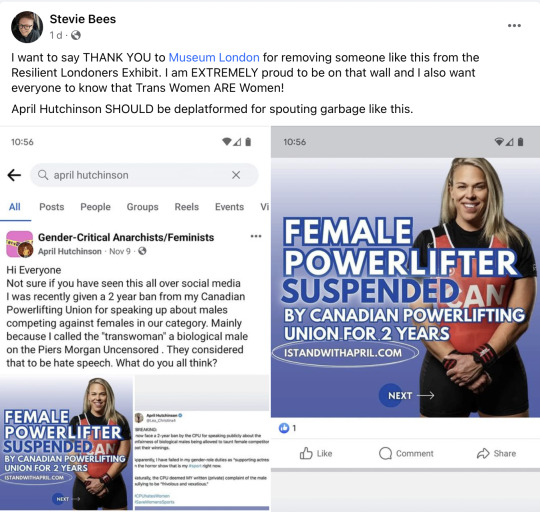
Hutchinson has been outspoken in her defense of women’s sports, both in interviews and on social media. She appeared on Piers Morgan Uncensored in August of this year where she argued that males should not be allowed to compete against females in powerlifting due to their inherent biological advantages.
Hutchinson has also spoken about how she approached Canada’s powerlifting governing body, the Canadian Powerlifting Union (CPU), about the issue of males participating in female competitions.
During an event hosted by Independent Council on Women’s Sports (ICONS) in June of this year, Hutchinson said the CPU told her the issue wasn’t a concern because there weren’t many trans-identified males competing in female divisions.

Earlier this month, Hutchinson was suspended from competing and is now potentially facing a two-year ban from the Canadian Powerlifting Union for airing her grievances with biological males competing in women’s sports.
The suspension and potential ban follows Hutchinson voicing concerns about Anne Andres, a trans-identified male powerlifter who had bragged about beating women and labeled female competitors “weak.” Anne Andres recently set the all-time record at the Canadian Powerlifting Union’s 2023 Western Canadian Championship after scoring over 200kg more powerlifting points than the top-performing female in the same class.
Despite her removal from the exhibit and suspension from powerlifting, Hutchinson says she’s received an outpouring of support, including from other female athletes like Martina Navratilova. She also explained that her activism is motivated by a desire to ensure safety and equal opportunities for women in sports.
“Women need and deserve their own sports. The female category has always been protected,” she says.
“My platform is about fairness and women’s sports. It has nothing to do with hate or [being] anti-trans. The museum is basically sending the message that trans rights are more important than women’s rights … but women are fighting back and we will send a stronger message: Bodies play sports not identities.”
#Canada#ontario#London#April Hutchinson is just telling the truth#the Canadian Powerlifting Union#Museum London#Resilient London: Meet Your Neighbours#The 2SLGBTQI community#Deplatforming women#Stevie Bees is a man who is happy that a woman was deplatformed#Independent Council on Women’s Sports (ICONS)#Women’s sports is for women#Women’s sports is not a backup plan for mediocre males
13 notes
·
View notes
Note
We know from the text that moon tea can be used both to prevent pregnancies and to terminate them. My question is, what do both law and custom in Westeros say about contraception and abortion ? And what else ways there are to make abortion in Westeros ? It seems like Cersei used a different method to abort the baby Robert had gotten her impregnated with (a decision that I wholeheartedly support),“Your Robert got me with child once,” she said, her voice thick with contempt. “My brother found a woman to cleanse me.” This may have been through the use of moon tea (as Cersei later says she knows of it), or it may have been a D&C or similar technique. What are your thoughts ?
Love, love this question, anon!
Before the answer, moon tea is also not always 100% safe and can cause severe side effects, like those that affect a young Lysa Tully. But so were most especially if dosed or taken wrong.
Here is AFfC Cerssi's thinking of Margarey, with the use of "murder" implying that like today's Christian religions, abortion is considered a "murder" of life:

So it's definitely an ideological belief that it's "murder" stemming from the most strict of Seven canon...yet in secular practice and custom, people use moon tea often enough for nobles to refer to it several times. There are no declarations or laws against either the use of moon tea or abortion itself, but you can see how abortion & moon tea and a woman revealed to be using if unmarried will suffer grievous censure or even death, according to circumstances. If you are a Queen Consort, for example, and you prevent your husband from having heirs/more heirs, you'd be seen and punished as meddling/ruining the line of succession. Of course, it'd be better if you already had kids but still, a Queen--who is supposed to model her behavior after the Mother(Seven)/the Virgin Mary, Mother of God, and Queen of Heaven is more beholden to her role as that AND a woman/child-bearer than a King is to his faithfulness to her. That doesn't necessarily mean EVERY single queen or noble wife obeyed of course, just means that if it found out, she would pay a heftier political and personal price than others.
Other real-life Europeans didn't obey the Church in everything or even to a certain zealous degree as people today might think, the church as after all an institution rather than the religion itself, though yes it can and has modified some beliefs to influence how it worshippers think about...pretty much everything of human existence and humans' relationship with the world (ex, colonization and the slave trades-missionaries). People held pagan-originated festivals, drank alcohol in great amounts, ate a lot, and had sex even when unmarried or extramaritally. (Example, the maypole) The most interesting fairytales people have or the ones that endure to this day are from pagan Celtic or Anglo-Saxon myths and religions or tales told for social control. There were medicinal and regular recipes from pagan Anglo-Saxon or Celtic rituals/life. Popes, priests friars, and monks had concubines and/or bastard children and used prostitutes for sexual relief, some even going so far as to advocate for the continuation of prostitution for the sake of keeping the "right" women from men raping them/the men having a place to expend their sexual energy. Some bishops and most Archbishops came from noble families to represent or be used for the families' political schemes/secular desires or ambitions and/or had some of their own. Anyone heard of the Borgias & Pope Alexander VI?
For some states, some monarchies, and some periods of monarchial Europe, a monarch could only be crowned and recognized as a ruler if the Catholic church/Pope crowned them. The Church informed the monarchy and vice versa. (Henry VIII made the English crown & England separate, forming the Anglican Church, which nonetheless retained many Catholic practices, imagery, etc. changing mostly in leadership, the crown.)
Even for a married woman, since the purpose of a noblewoman is to produce heirs for her lord/king, if she'd found "willfully" taking moontea for something else other than preserving her life and master-recommended and her husband at least in some way aware...well. I don't need to spell it out for you. So this also speaks for contraception implied as an unideal necessity conditioned on decisions from others outside the woman herself. According to circumstance.
D&C (Dilation and curettage) is only first recorded in late 19th cent for Europeans. Westeros is modeled after medieval-early modern period Europe, specifically England, France, the Italian states, and Germany. As far as I know, it wasn't a real option for real-life med/Tudor people, so it wouldn't exist for Westeros, esp w/how invasive it is, people arent really going to think of this. (btw, today as well as in the 19th century, people don't just use D&C for abortions)
I also don't think that moon tea was the only resource women had to contraception and abortion. That would be too implausible, esp considering how women had more than one way to prevent or end pregnancies. Sure, it's possible that Cersei used something other than moon tea since she'd want to not be discovered and moon tea is so recognizable and known. We don't have the details, Cersei also could have taken moon tea. If she didn't there is no named alternative to moon tea that I could remember nor from what I tried to research.
#asoiaf asks to me#westerosi society#abortion#contraception#cersei lannister#westerosi women#asoiaf#agot#a feast for crows
9 notes
·
View notes
Text
Moving (2023) Roundtable

Moving (2023) is a Korean Drama show where certain people have superpowers. The protagonist, Kim Bong-seok, is a highschooler who has the ability to levitate, along with all of his senses being greatly increased. The heroine, Jang Hee-soo, has the power to regenerate. We learn over the course of the show that their parents also had the same abilities as them and were special agents for Korea, going on various missions for the country.
How do structural mythology, cultural studies, and cultural history reflect the series’ world and world-building around superheroes?
Cultural studies and history greatly alter the world-building, as the superheroes in the series have to hide their identities. Many with powers work as agents, going on special missions for their country. Any media that potentially leaks information on the existence of people possessing superpowers is immediately deleted from the web. Agents with powers must have codenames and need to keep their true identities hidden from the general public.
In what ways are the superheroes and their abilities informed by their racial, gender, sexual, and cultural identities?
Lee Mi-hyun, the mother of the protagonist Kim Bong-seok, is greatly affected by her gender. She is a retired agent who is the only woman to participate in a black ops mission. However, after losing much of her eyesight, she is forced to become an information analyst. Here, she is given the job of becoming close with another black ops agent in order to get information out of him. She is only chosen for the job because of her looks. Within this agency, it is clear that men are chosen for on field work while women are not.
In what ways do costumes and concealing identities further separate the superheroes from normal society? How necessary is it for the superheroes to hide their true identities to successfully achieve their goals?
It is necessary for the superheroes to conceal their identities because if revealed, they can be targeted by other agents from rival countries. An agent named Frank is given a mission by the US to track down and kill retired Korean agents, and he succeeds in eliminating quite a few. Blending into normal society and keeping their identities and powers hidden is an important part of the job for each of the agents.
How do the economic, political, and social events that occurred during the series’ creation and broadcast cultivate and inform the superheroes’ decisions and actions?
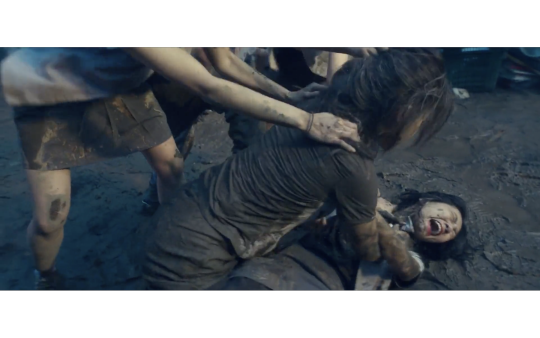
The backstory of the heroin, Jang Hee-soo, is revealed partway through the show. It is shown that she makes the decision at her old school to fight a group of bullies, seventeen in all. Because of her ability to regenerate, she leaves the fight without a scratch. There is an interesting dichotomy between her character and the US agent Frank, who also has the ability to regenerate. However, Frank is like a machine, a man who grew up in Iowa and has no motive but to complete missions. While Hee-Soo fights bullies, Frank is often the bully. Yet we see how similar the two characters actually are, as both are seen choking one of their enemies in their backstory. Frank having no concept of family is shown throughout his character arc, signaling that his fate would have been different with a better upbringing.

How do the superheroes question themselves, each other, and their obligations and duties to the people around them?
The protagonist, Kim Bong-seok, is forced to wear weights on his ankles and carry a heavy backpack to avoid levitating in front of other people. This decision is made by his mother, who is very overprotective. We learn later on that his mother acts this way because of the death of the father, who also had the ability to levitate. Because his mother is overprotective and at times very controlling, Bong-seok grows up very submissive. There is a moment in which he confesses that he does not like himself as a person and wants to change. Had he not been given powers, his character and personality would probably be much different.
youtube
#oxyspeculativetv @theuncannyprofessoro
12 notes
·
View notes
Text

lamentation
sirius black & walburga black
teen | 2.1k words
they would give me a guest room at the top of the house, where a view of london unfolded before me like a pen-and-ink drawing, and the walls were soft and pink, their paper patterned with undulating roses. the house seemed, then, like a paradise.
but that was before. before they sold me to a man i did not love. before my sons were born.
my sons are both dead now.
walburga's portrait is told that sirius is dead.
this piece was written for @womenofthehouseofblack fest, [you can find the other fics in the collection here].
author's notes under the cut

i found the prompt for this piece - what would happen when walburga's portrait was informed of sirius' death - immediately intriguing, because walburga’s portrait is a character i find incredibly interesting; firstly, because she is described in ways which make her sound ancient when she actually died in her early sixties, and secondly, because she provides a fascinating insight into how the wizarding world thinks about mental illness.
i have always hated the fanon about black family madness - particularly since it is so frequently only applied to the women of the family - due to the way in which it undermines the harry potter series’ focus on the value of choice. turning walburga and bellatrix’s cruelty into something innate or genetic distances them from the reality of what they did and how their decisions affected other people. it also prevents them from having complicated emotions and motivations, and - above all - it prevents them from having the capacity to atone for their deeds.
it also denies the fact that a huge amount of mental illness is treatable.
i have always had the headcanon that walburga’s relationship with her sons was affected by untreated postnatal depression - also a theme in nor all that glisters gold [author’s notes here], another piece of mine for this fest - which is exacerbated in lamentation by the additional pain of her high-risk pregnancy and traumatic birth experience with sirius. unable to bond with her son, who she thinks is a changeling, but confined to the house with him by the rigidity of gendered pureblood social convention, her illness spirals into psychosis.
the wizarding world seems to be of the opinion that mental illness doesn’t really exist. when this is examined through the lens of gender, an obvious parallel appears between women’s writing about mental illness in the nineteenth century - walburga, who is, in canon, a pastiche of the madwoman in the attic [the most famous example of which is, of course, bertha rochester from jane eyre] deserves an examination from the other side of the trope. the repeated motif in lamentation of the roses in the wallpaper is a reference to charlotte perkins gilman’s the yellow wallpaper - one of the clearest examples of the damage done to victorian women by the isolation and condescension they received from men in lieu of any holistic treatment for their illness. walburga’s dialogue - the portrait’s screams competing with a more lucid monologue - was inspired by the contrast between how antoinette "bertha" rochester speaks in jane eyre and how she speaks in jean rhys’ wide sargasso sea.
and, as antoinette gets a chance to speak for herself in that text, walburga gets a chance to speak for herself here - something she is denied in the canon narrative, which reduces her to an incoherent, screaming bigot [even as kreacher tells us that sirius leaving home broke her heart]. lamentation offers some contextualisation for the canonical walburga’s obsession with blood and its purity - she does, after all, a significant amount of bleeding in this piece, which naturally distresses her - and with belonging to and being a real member of the family - after all, regulus was snatched by the fairies, and dragged down into the netherworld; sirius left and then came back and then was snatched himself.
an important postscript: both postnatal and antenatal depression are common conditions. they affect more than one in ten pregnant women, they can strike anyone in any circumstances [you can experience them even if your pregnancy was "easy" or if you have a lot of support in the first weeks of your baby’s life], and they are never your fault. they can be serious - and it’s crucial that we challenge the pervasive myth that they are "less serious" than other forms of depression - but they are inherently treatable. the best thing that you can do is to know the signs of these and other perinatal mental illnesses, whether for yourself or for someone else, and make sure to seek help if any of them seem to be present. a diagnosis of postnatal depression does not mean that you will be seen as an unfit parent, and it will not automatically result in your baby being taken away.
the following pages may be useful:
action on post-partum psychosis - for anyone who experiences psychosis during and after pregnancy, provides useful information, resources for health professionals, and advice on how to access support.
association for postnatal illness - for anyone who experiences a mental illness during and after pregnancy, provides useful information and resources.
birth trauma association - for anyone who experiences post-traumatic stress disorder after birth, provides useful medical and legal resources, as well as links to support groups and other contacts.
breastfeeding network - for anyone who wishes to breastfeed and requires support, has links to local support groups.
home start - for parents who need support, provides advice on topics from mental health to financial aid and can offer direct support to families in need.
maternal ocd - for anyone who experiences obsessive compulsive disorder during pregnancy or after birth, provides useful information and resources.
pandas - for anyone who experiences depression or anxiety during and after pregnancy, provides direct support.
postpartum men - for men who experience mental illness during or after (their partner's) pregnancy, provides useful information and resources.

#asenora fics#walburga black#sirius black#regulus black#lamentation#women of the house of black fest
21 notes
·
View notes